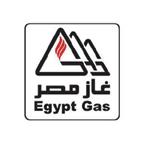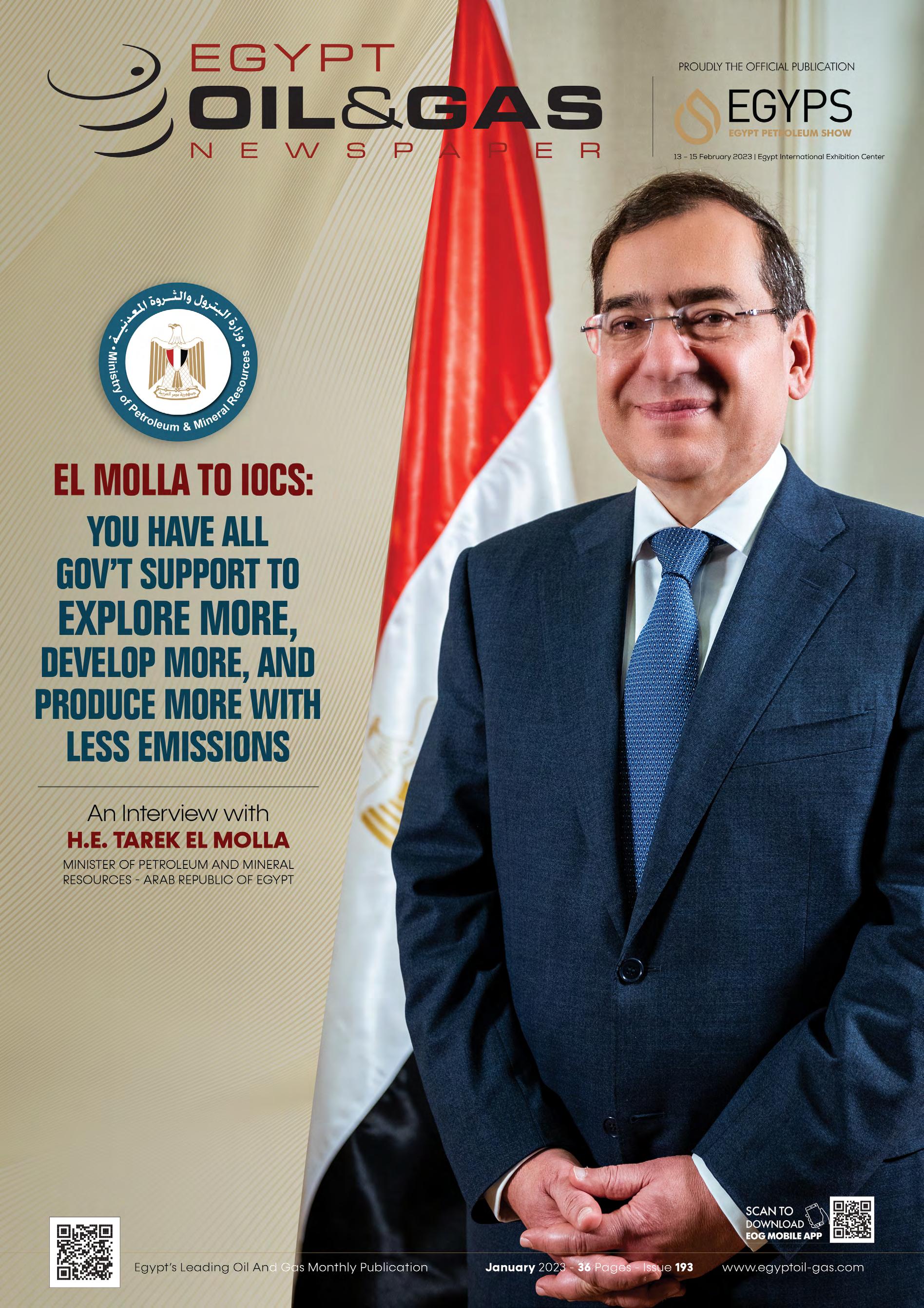

EDITOR’S LETTER
Dear Reader,
Despite numerous challenges, Egypt’s petroleum sector has demonstrated resilience in 2022, making significant achievements and promising more opportunities in the coming year. In this issue, we had the chance to have an exclusive interview with H.E. Tarek El Molla, Minister of Petroleum and Mineral Resources, who shared with us the sector’s success story in 2022. In his inclusive and informative statements, El Molla also gave us details about the Ministry’s plans for 2023 and wished the sector even greater success in the future.
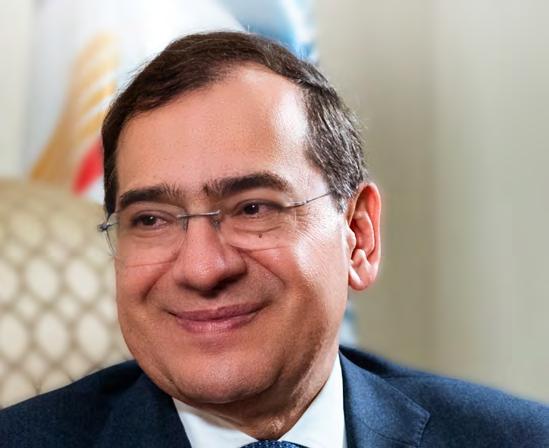
In the issue, the Research and Analysis team is offering an insightful analysis of the sector’s achievements in 2022. We are also introducing an outlook on the industry in 2023.
Our writers discussed experts’ views on the challenges and opportunities available for the oil and gas sector given the current economic and geopolitical risks. I hope you enjoy reading our issue and wish you a happy, prosperous year ahead.
IHAB SHAARAWY Managing EditorCONTENTS
An Interview with
H.E. Tarek El Molla
Minister of Petroleum and Mineral Resources - Arab Republic of Egy
10
General Manager Ayman Rady Research & Analysis Manager
Dr. Mahinaz El Baz Managing Editor Ihab Shaarawy Senior Editors Rana Al Kady Nader Ramadan Senior Writer Sarah Samir Staff Writers Fatma Ahmed Israa Nour Eldeen Senior Research Analyst Reham Gamal Research Analysts Youstina Mounir Jolly Monsef Mariam Ahmed Statistician Nada Abbas Chief Reporter Wael El-Serag Business Development Manager Tamara Ewiss
Marketing Specialist Shrouk Ihab
Creative Art Director Omar Ghazal Art Director Maged Khattab Graphic Designer Merna William 3D Visualizer Tamer Gamal Photographer Hady Nabil CEO Executive Assistant Noha Zayed Web Master Olfat Kamel Web Developer Mohamed Elwakeel
Administration
Taghreed Mounir Senior Accountant Mahmoud Khalil Accountant Mohamed Nagy Distribution Officers Mahsoub Kenzi Mohamed El-Sayed Mahmoud Nabil Osama Mohamed Hesham Mohamed
Publisher
Mohamed Fouad
All rights to editorial matters in the newspaper are reserved by Egypt Oil and Gas and no article may be reproduced or transmitted in whole or in part by any means without prior written permission from the publisher.
i-Trak drilling automation services
Get safe, efficient, and predictable drilling
performance
i-Trak drilling automation services from Baker Hughes reduce operational risk and well delivery costs by integrating and automating drilling systems.

In today’s complex drilling environment where surface and downhole real-time systems must deliver according to plan in a predictable, efficient, and safe manner, automation of drilling systems is crucial. The drive to reduce HSE risks by moving personnel from wellsite red zones to remote centers is simplified and supported through the integration and automation of drilling systems.
Baker Hughes’s i-Trak drilling automation services improve drilling performance, wellbore quality and trajectory; extend bit life; reduce nonproductive and invisible lost time (NPT, ILT) to deliver wells faster and more economically while reducing operational risk to enable de-manning at the rigsite. These benefits are achieved by aggregating real-time surface and downhole data and annular pressures, and using hybrid physics-based and data-driven models, in combination with automated standardized operating procedures and checklists.
Our i-Trak drilling automation services manage well construction via fully closed loop-control of Baker Hughes rotary steerable assemblies, wellbore
hydraulics, and drilling optimization services.
i-Trak services offers two levels of automated control:
• Advisory mode: recommended actions or parameters are displayed to the driller who can accept or reject them
• Closed-loop mode: parameter changes and instructions are automatically downlinked to downhole tools or transmitted to rig automation platforms to control surface parameters.
In closed-loop mode, the human driller can start/stop the system at any time to make any desired adjustments to the drilling path or operational parameters.
The i-Trak service is a fully integrated extension of Baker Hughes’ digital well planning software and ecosystem. This allows i-Trak to monitor and control drilling and reservoir navigation operations based on a continuously updated digital twin of the reservoir and downhole environment.
Contact your Baker Hughes representative to learn how i-Trak drilling automation services can help you achieve safer, more efficient, and more predictable performance on your next well.
Applications
• Wells with inefficient, or inconsistent or unpredictable drilling performance
• Wells with hole cleaning issues, stability issues, or challenging pressure windows
• Wells that must be consistently and repetitively drilled
• Wells using decision-making remote operations or leveraging integrated operations personnel models
Benefits
• Improved safety, lower risks
- Openhole pressure regime monitoring with automated alerts
- Swab/surge NPT protection
- Reduced personnel risks
• Superior drilling and reservoir navigation efficiency
- Improved hole cleaning
- Optimized tripping speeds
- Guaranteed average-excess dogleg severity limits (AEDLS) <1°/100 ft. (30m)
- Increased hydrocarbon recovery
• Predictable drilling performance
- Increased gross ROP
- Fewer stuck pipe incidents
- Reduced NPT and ILT
EGYPT FINALIZES $1.1B DEAL WITH AMEA POWER TO IMPLEMENT TWO RENEWABLE ENERGY PROJECTS
Prime Minister Mostafa Madbouly witnessed the signing of financial closure agreements between AMEA Power from the UAE and a number of international financing institutions worth $1.1 billion to construct two renewable power stations in the Jabal Al-Zayt area of Red Sea Governorate and Kom Ombo in the Aswan Governorate, with a production capacity of 1000 megawatts.
It should be noted that the financial closure in this case refers to reaching an agreement with international institutions to secure the necessary financing,
marking the start of the implementation of the two projects.
On the sidelines of the signing, Mohamed Shaker, Minister of Electricity and Renewable Energy, said that AMEA Power was able to achieve a successful financial closure with the aim of establishing two plants to produce electricity from solar energy and wind energy, with a capacity of 1,000 megawatts, which would enhance the Egyptian market’s dependence on renewable energy sources.
EL MOLLA HEADS EGYPTIAN DELEGATION AT OAPEC MEETING
IN KUWAIT
Minister of Petroleum and Mineral Resources Tarek El Molla headed the Egyptian delegation participating in the 109th ministerial conference of the Council of Ministers of the Organization of Arab Petroleum Exporting Countries (OAPEC), the ministry said in a statement.
The conference was held in Kuwait, with the participation of the ministers of petroleum and energy of the member states Kuwait, Saudi Arabia, the UAE, Algeria, Iraq, Qatar, Libya, and Bahrain, and the Secretary General of the organization Ali Sabt bin Sabt.
El Molla stated that the conference represents great importance in activating aspects of cooperation between Arab countries in the oil and gas industry on
the basis of mutual benefit, in a way that enhances Arab integration in this vital industry and achieves common interests. It also represents an opportunity for consultation and exchange of views on developments in the oil markets in light of current challenges.
A press statement was issued by the Secretary-General about the 109th meeting of the OAPEC Council of Ministers, in which it stated that the Organization’s Council of Ministers held its 109th meeting in the State of Kuwait on December 12, 2022, AD, headed by Bassam Radwan Tohme, Minister of Oil and Mineral Resources of the Syrian Arab Republic, which presides over the 2022 session.
A BLAST FROM THE PAST
On the 31st of January, 2018, President Abdel Fattah El Sisi inaugurated the first stage of the giant Zohr gas field. Zohr field is believed to be the largestever gas discovery in Egypt and the Mediterranean. The integrated approach taken with this project has enabled Egypt to bring the gas onstream in just over two years from the initial discovery, a record for this type of deposit.
Zohr is located within the Shorouk concession, approximately 190 km north of the city of Port Said. Eni has a 50% stake in the block and is responsible for operations there. The other stakeholders are Rosneft (30%), bp (10 %) and Mubadala Petroleum (10%).
EGYPT OIL & GAS,

MINISTRY
At an open dialogue meeting in Enppi’s Cairo headquarters, new members of the Egypt Oil & Gas (EOG) Committee from Egypt’s national oil companies (NOCs) were jointly welcomed by Egypt Oil & Gas and the Ministry of Petroleum and Mineral Resources.
The meeting was attended by many industry leaders from the Ministry, international oil companies (IOCs), and NOCs.
The Ministry’s Undersecretary of the Technical Office Alaa Hagar opened the meeting by pointing out that Minister of Petroleum and Mineral Resources Tarek El Molla has emphasized the importance of EOG’s role in uniting the sector’s stakeholders together to work for one purpose. “He wanted the EOG taskforces to be a platform for cooperation between IOCs and NOCs in order to exchange ideas on the challenges and opportunities we face as a sector,” Hagar
OF
PETROLEUM
WELCOME NEW NOC MEMBERS TO EOG COMMITTEE
said. “[It’s] also to help the acceleration of efforts to secure a sustainable future for the sector in our beloved country. I am confident that this platform will provide a unique opportunity for NOCs and IOCs to foster deeper partnerships and engagements.”
EOG Committee Chairman David Chi, who is also the Vice-President of Apache Corporation and Country Manager for Apache in Egypt, started the session by outlining the importance of the EOG Committee’s work and the Minister’s tireless efforts in COP27. “The Committee has been very successful for many years in making a very significant impact, sometimes directly [or] sometimes indirectly,” Chi said. “I want to congratulate the Ministry’s team, and His Excellency [the Minister of Petroleum and Mineral Resources] in particular, for a very successful COP27 Decarbonization Day.”
COPRECI TO ESTABLISH FIRST GAS SAFETY VALVE FACTORY IN EGYPT
Spain’s Copreci has signed a partnership with Egyptian appliances firms Fresh and El Araby Group in order to establish the country’s first gas safety valve factory, according to a statement by the state’s Ebdaa initiative.
The $7.6 million facility will produce 15 million valves a year and is set to start operations in April 2023.
The shareholder agreement was signed by Ebdaa SAE, which is the executive arm of the National Initiative for the Development of Egyptian Industry, on
December 13th, according to Akhbar ElYom Newspaper.
The cooperation with Fresh and El Araby comes within the fruitful framework to enhance the role of the private sector to localize modern industries and reduce the import gap by adding new investments to the industrial sector.
It is worth noting that the national initiative for the development of Egyptian industry “Ebdaa'” was launched by President Abdel Fattah El-Sisi in April 2022.
EL MOLLA: 14M HOUSEHOLDS CONNECTED TO NATURAL GAS
Minister of Petroleum and Mineral Resources Tarek El Molla announced that about 60% of the households to which natural gas was connected over the past 42 years have been achieved during the last eight years alone, with about 8.3 million housing units out of more than 14 million housing units benefiting from natural gas till date, the ministry said in a statement.
The minister stated that this development in the rates of natural gas delivery to homes serves over 60 million citizens in
these units and saves about 250 million gas cylinders annually.
This came during the minister’s speech during the meeting, which was held in the presence of the leaders of the petroleum sector and the ambassadors of the European Union (EU) and France in Cairo, at the conclusion of the joint project funded by the EU, the French Development Agency and the World Bank (WB) to deliver natural gas to about 2.3 million households in 20 governorates in cooperation with the Egyptian Natural
During the Egyptian Economic Conference 2022, President Abdel Fattah El Sisi stated that Egypt would have plunged into darkness if it were not for the Zohr natural gas field. He explained that without the Zohr gas field, Egypt would need $2 billion monthly to import natural gas for its power plants, and this could reach $10 billion monthly with the current prices.
NUMBER OF THE MONTH
Implemented Natural Gas Field Development Projects over the Last 7 Years
By promoting natural gas production, Egypt was able to establish its position as a regional natural gas hub. In fact, Egypt leverages from large gas discoveries in the latest years like Zohr field as well as massive gas reserves in the Eastern Mediterranean region.
In this regard, the Ministry of Petroleum and Mineral Resources (MoP) implemented a number of projects to develop gas fields during the past seven years with investments of about $21 billion. As a result, the average production of Egypt reached 6.5 billion cubic feet of gas per day (bcf/d), according to the MoP.
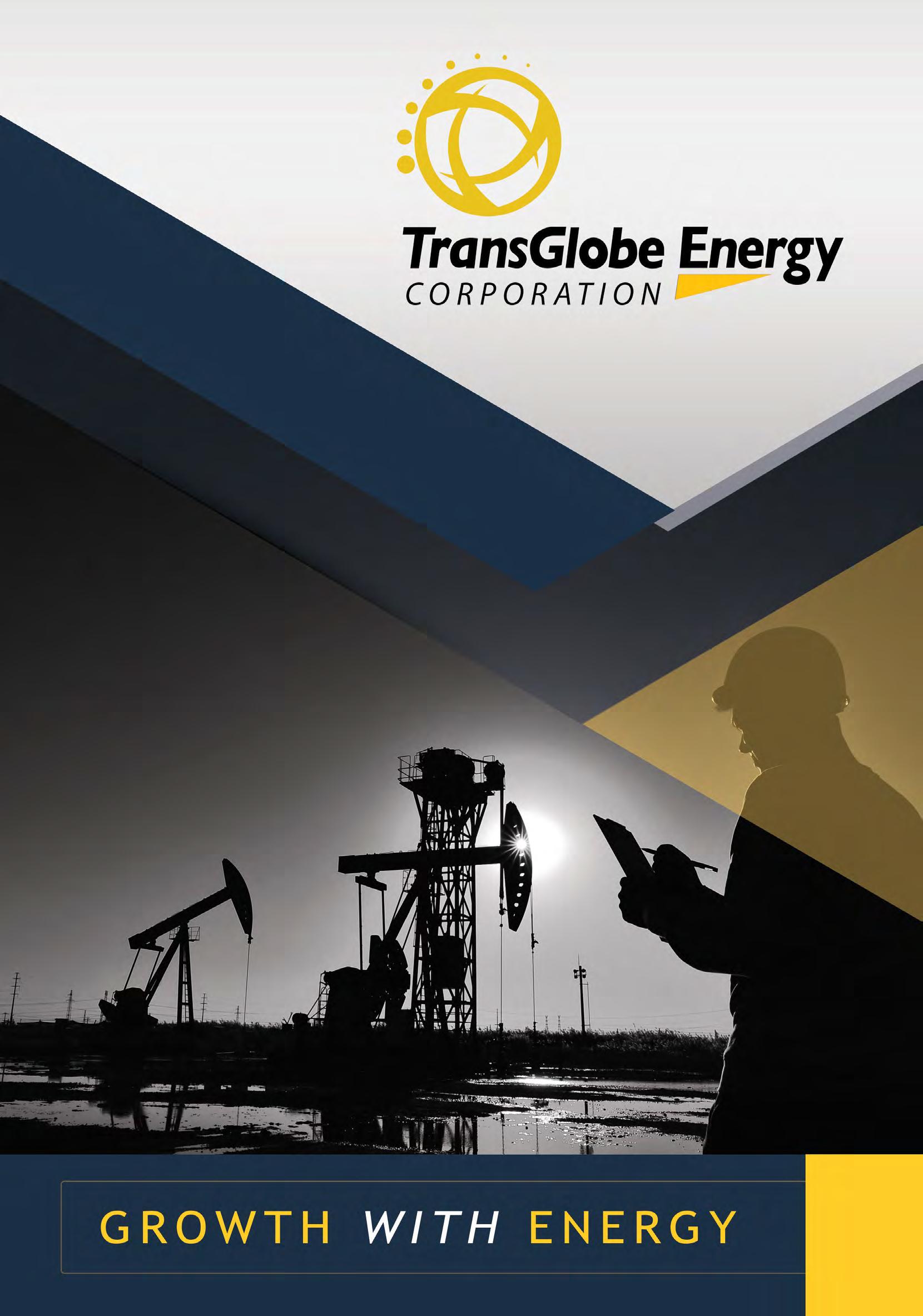
LUKOIL REVIEWS CURRENT BUSINESS, FUTURE PLANS IN A MEETING WITH EL MOLLA
Minister of Petroleum and Mineral Resources Tarek El Molla has met with Lukoil’s Vice President for the Americas, Western Africa and Europe Ivan Romanovsky to discuss its current projects in a number of concessions areas in the Eastern and Western Deserts in Egypt and how to boost these investments.
The meeting also included a presentation on the company’s concession areas in West Esh El Mallaha in which it owns 50% of its shares in partnership with Thawra Petroleum Company in addition to Meleiha Concession in the Western Desert in which it owns an interest of 24% in partnership with Eni.
El Molla affirmed that the cooperation between the petroleum ministry and Lukoil is extended for a long time and witnessed many success stories. He noted that there are a lot of promising and motivating opportunities to enhance its oil and gas investments.
For his part, Romanovsky has presented the working plans and programs of the company in Egypt stressing the company’s desire to boost its presence in the country through taking part in new concession areas. Additionally, he discussed the company’s business of manufacturing electrical submersible pumps (ESP).
EGYPT HOSTS 8TH EMGF MINISTERIAL MEETING
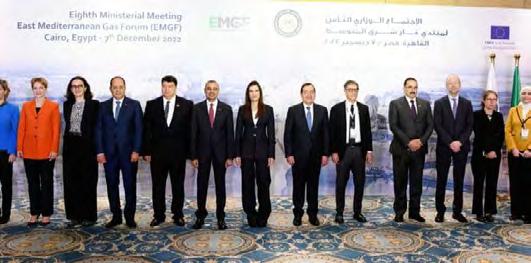
Egypt hosted the Eastern Mediterranean Gas Forum’s (EMGF) Eighth Ministerial Meeting in Cairo on December 7th, where Tarek El Molla, Minister of Petroleum and Mineral Resources, received the presidency of the next session of the forum during the year 2023 from the current president of the forum in 2022, Natasa Pilides, the Cypriot Minister of Energy and Industry, the Egyptian ministry said in a statement.
The meeting was attended by Osama Mobarez, Secretary-General of the Forum, and heads of delegations from Greece, Italy, Jordan, Israel and France, and among the observer members are the delegations of United States, the European Union (EU) Energy Commission, and the World Bank (WB).
In his opening speech, El Molla stated that the current events and the global energy situation
MINING
demonstrated the importance of the proactive step taken by establishing the EMGF. The forum presented an important initiative and study in the field of reducing emissions and gas industry’s decarbonization for the first time during the COP27 climate summit. It also provided an important aspect of the global energy supply during the current period, which is witnessing many challenges.
MADBOULY, EL MOLLA DISCUSS THE GOLDEN TRIANGLE’S POTENTIAL
Prime Minister Mostafa Madbouly held a meeting today to follow up on efforts to develop the Golden Triangle region, in the presence of Tarek El Molla, Minister of Petroleum and Mineral Resources; Ahmed Samir, Minister of Trade and Industry; and Adel Saeed, Chairman of the General Authority for the
Economic Zone of the Golden Triangle, the Cabinet announced.
At the beginning of the meeting, Madbouly stated that the Golden Triangle will be a promising area in the field of mining, because it contains mineral wealth, pointing out that extensive studies have already been prepared on this matter, including an Italian study.
EL MOLLA REVIEWS PROJECTS SUBMITTED TO THE GOLDEN TRIANGLE AUTHORITY
Minister of Petroleum and Mineral Resources Tarek El Molla held a meeting with the Board of Directors of the General Authority for the Economic Zone of the Golden Triangle headed by Adel Saeed, Chairman of the Authority, the ministry said in a statement.
The meeting witnessed a review and discussion of offers and investment projects submitted to the Authority in the Golden Triangle area.
The meeting was attended by Ashraf Al-Dawdy, Governor of Qena, Amr Hanafi, Governor of the Red Sea, members of the Board of Directors, Alaa Khashab, Deputy Minister for Mineral Resources, and accountant Hisham Noureddine, Chairman of the Central Administration for Minister’s Office Affairs.
During the meeting, El Molla highlighted the importance of working to encourage new investments in the Golden Triangle project, in implementation of the mandates of the political leadership and the government to stimulate and encourage investment, in a manner that prepares the environment for the rapid development of the region, the flow of investments to it, and the completion of projects of great economic benefit to achieve the goals of the Egyptian state from this national development project. This should reflect the great modernization of investment laws in Egypt and keep pace with global economic changes.
EGYPTIAN NATURAL GAS EXPORTS HIT A RECORD OF 8M TONS IN 2022
Egyptian natural gas exports surged to a record 8 million tons in 2022, compared to about 7 million tons in the previous year, the Ministry of Petroleum and Mineral Resources said in a statement about 2022 achievements and milestones.
The value of natural gas exported during the year amounted to around $8.4 billion, compared to about $3.5 billion in 2021, an increase of 171% over 2021, due to the increase in liquified natural gas (LNG) export prices globally.
Minister of Petroleum and Mineral Resources Tarek El Molla commented on the 2022 achievement stating that the petroleum sector doubled its efforts during 2022 in order to increase production and accelerate the development and modernization of infrastructure and raise its efficiency.
The ministry has taken it upon itself to modernize the methods of attracting foreign investments to search for oil and gas in Egypt and follow the best international practices, which reflected positively on attracting new major companies to work in Egypt and strengthening the investments of existing international companies, as these investments are the cornerstone of intensifying research and exploration activities to discover more oil and gas reserves and increased production, El Molla noted.
EL-SISI FOLLOWS UP ON STATE EFFORTS TO EXPLORE FOR
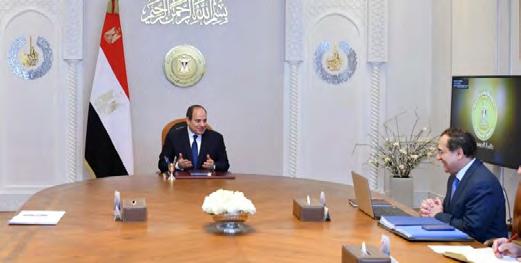
NATURAL GAS, PETROLEUM
President Abdel Fattah El-Sisi has directed to expand oil and gas exploration efforts to make the best use of Egypt’s resources and help increase the natural gas reserves in order to meet the needs of the local market and increase exports.
This came during his meeting with Prime minister, Dr. Mostafa Madbouly, and the Minister of Petroleum and Mineral Resources, Eng. Tarik El Molla.
The Spokesman for the Egyptian Presidency said that the meeting followed up on the state’s efforts to explore for natural gas and petroleum.
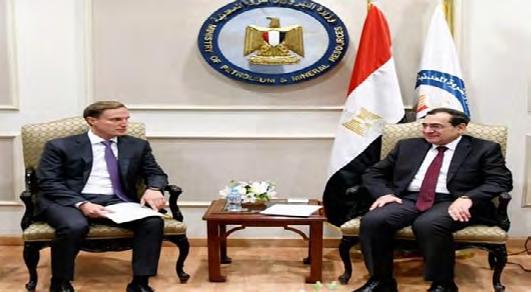
During the meeting, El Molla reviewed the current and future investment plans in terms of gas exploration until 2025 in the eastern and western regions of the Mediterranean. Major international energy companies take part in these plans with a total investment of about $2.1 billion.
According to the preliminary results, it is expected that the exploration efforts will result in promising discoveries that will support the national economy and consolidate Egypt’s position as a regional hub for energy production and trading.
EGAS TAKES FIRST STEPS TO IMPLEMENT GREENHOUSE GAS EMISSIONS MANAGEMENT AGREEMENT
Within the framework of the greenhouse gas emissions management agreement that was signed at COP27 between Egyptian Holding Company (EGAS) and Shell, EGAS held a meeting on November 27 at its headquarters to discuss the first steps of emissions reduction efforts.
The meeting was held in the presence of Ashraf Ramadan, the company’s Chairman Assistant for Environmental Protection and Supervisor of Occupational Health & Safety. It also included team members from the Department of Sustainable Development in Environmental Protection with representatives of Shell, in addition to the experienced external consultants in this field from Nexus company, with the aim of exchanging experiences, under the auspices of Magdy Galal, EGAS Chairman.
The meeting began with an opening speech by Ramadan, in which he emphasized that this meeting is the first step in implementing the agreement and its expected outputs to develop a guide for the subsidiaries.
He also emphasized the importance of forming a sustainable management system to bring about comprehensive development and change in the various activities of the petroleum sector by working more efficiently in terms of managing these emissions.
EGYPT, ENI SIGN CSR AGREEMENT TO SUPPORT HEALTH SECTOR IN PORT SAID

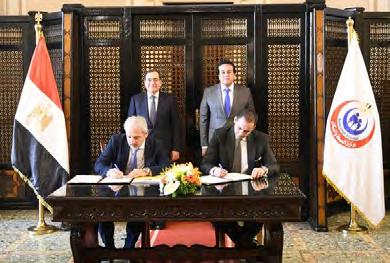
Minister of Petroleum and Mineral Resources Tarek El Molla and the Minister of Health and Population Khaled Abdel Ghaffar have witnessed the signing of an agreement between the Minister of Health and Eni Foundation, represented by IEOC, to support a community health project and raise medical efficiency at Port Said to achieve Egypt Vision 2030.
This came as part of the oil and gas sector’s social responsibility strategy. El Molla affirmed that this agreement is a model for the petroleum sector’s commitment to community development and contribution strategy in order to help in the sustainable development goals.
The minister also emphasized Eni’s keenness to support the Egyptian community as well as the petroleum sector’s interest in health projects especially the establishment of a burn center for
children at Port Said noting that there are several contributions from the sector to health projects during the upcoming period in different governorates.
For his part, Abdel Ghaffar stated that this agreement aims to provide international accreditation for the Medical Team Training Center in Port Said. The protocol includes four training programs, three of them for doctors in the fields of orthopedics, gynecology and interventional radiology, in addition to nursing training in the field of cardiac catheterization, he added.
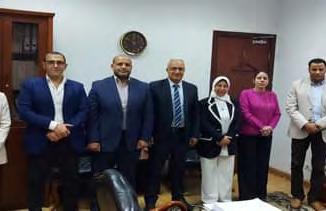
EGYPT, AIBEL DISCUSS
THE MAINTENANCE SYSTEM TO REDUCE EMISSIONS
Minister of Petroleum and Mineral Resources Tarek El Molla met with the CEO of Aibel Mads Andersen and a delegation from the company, being a foreign partner with the Egyptian General Petroleum Corporation (EGPC) in the Egyptian Maintenance Company (San Masr).
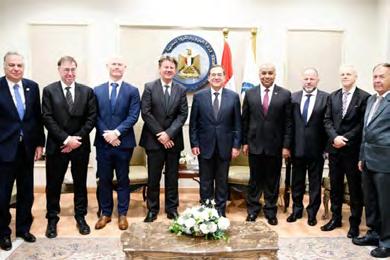
During the meeting, El Molla pointed out that the active participation of ministers, global corporate leaders, and heads of international financing institutions in COP27’s Decarbonization Day drove the oil and gas industry to actively contribute to decarbonization and environmental preservation efforts.
El Molla stated that upgrading the maintenance system comes on the list of the petroleum sector’s interests due to its effective role in reducing emissions.
For his part, Andersen praised the success of COP27 and the emphasis on the importance of the energy transition while benefiting from new and renewable energy sources.
During the meeting organized by San Masr on the occasion of the “Silver Jubilee” and the 25th anniversary of its establishment in 1997 to become an effective partner in advancing the sustainable development of the petroleum sector and the national economy.
EL MOLLA SIGNS TWO CSR AGREEMENTS FUNDED BY ENI
Minister of Petroleum and Mineral Resources, Tarek El Molla, signed two corporate social responsibility (CSR) agreements for social development, the ministry said in a statement.
The first agreement is for implementing integrated development for rain-fed communities in Matrouh Governorate, and the second agreement is for implementing an integrated, smart, and sustainable community in Wadi Al-Maktab in Abu Dis, South Sinai Governorate, using modern technologies. The minister also witnessed the signing of The two executive contracts for the two agreements.
After the signing, El Molla stated that the two agreements and contracts come within the framework of the petroleum sector’s social responsibility towards our people in the two governorates, and based on the ministry’s role in achieving sustainable development in line with Egypt’s Vision 2030 and the
presidential initiatives to improve the citizen’s standard of living.
El Molla said that the Supreme Committee for the implementation of the petroleum sector’s strategy for social responsibility gives priority to community development projects, and that the two agreements and contracts will be funded by Eni through its partnership with the petroleum sector in both Belaim Petroleum in Sinai and Agiba Petroleum in Matrouh, which have strong links with their surrounding communities and exert distinguished efforts in cooperation with the executive bodies and civil society institutions in the two governorates.
EXPLORATION
EGYPT PROVIDES ATTRACTIVE INVESTMENT CLIMATE FOR OIL, GAS EXPLORATION: EL MOLLA
Minister of Petroleum and Mineral Resources Tarek El Molla stated that the current period requires everyone to join hands to achieve the hopes and aspirations of the people, stability and development, the ministry said in a statement.
This came in his opening speech to the Sixth Al-Ahram Energy Conference entitled (Securing Energy Sources… Global Challenges and the Egyptian Experience), which was delivered on his behalf by Magdy Galal, Chairman of the Egyptian Natural Gas Holding Company (EGAS), in the presence of a group of oil sector leaders and heads of oil and gas companies.
El Molla explained that energy security is an important and vital matter, which reflects the importance of efforts to provide an attractive investment climate to increase the attractiveness of the Egyptian oil and gas industry in front of international companies to attract many investments that contribute to the rapid rotation of the wheel of research and exploration in various land and sea regions of Egypt and to accelerate the pace of business, developing the discovered fields, pointing to the signing of 108 agreements to search for oil and gas with international companies, with investments of a minimum of $22 billion over the last seven years.
UPGRADING
NEPTUNE ENERGY ANNOUNCES NEW DISCOVERY IN THE NORWEGIAN SEA
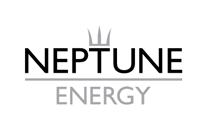
A new discovery has been made at the Calypso exploration well (PL938) in the Norwegian Sea, according to Neptune Energy and its license partners.
According to preliminary calculations, there are between 1 and 3.5 million MSm3 of recoverable
oil equivalent, or 6 to 22 million barrels of oil equivalent.
Neptune Energy’s third find on the Norwegian Continental Shelf in the last six months is Calypso.
Managing Director for Neptune Energy in Norway and the UK, Odin Estensen, said: “We actively explore in areas close to existing infrastructure. These near-field discoveries allow for low cost and low carbon developments.”
BP BP BEGINES PRODUCTION FROM TRINIDAD AND TOBAGO’S CASSIA C FACILITY
bp Trinidad and Tobago LLC (bpTT) announced that the first gas from the Cassia C development has been securely transported.
Cassia C is bpTT’s first offshore compression platform and its biggest offshore facility. By doing so, bpTT will be able to utilize and generate low pressure gas resources in the Greater Cassia Area.
PETRONAS

The platform, which is the 16th offshore facility for bpTT, is linked to the current Cassia hub, which is located around 35 miles off the southeast coast of Trinidad.
“First gas from Cassia C is an important milestone for bp in Trinidad and Tobago. This first offshore compression facility will allow us to unlock new
resources and bring much-needed gas to market,” said David Campbell, bpTT president
Cassia C’s production is expected to reach about 200-300 million standard cubic feet of gas per day at peak. Production is necessary to maintain T&T’s LNG and petrochemical industries as well as to fulfill bpTT’s gas supply commitments.
PETRONAS, ITS PARTNERS AWARDED AGUA MARINHA BLOCK IN BRAZIL BID ROUND
The Agua Marinha exploration block was won by PETRONAS Petróleo Brasil Ltda. (PPBL) and partners during the first round of Brazil’s open acreage under production sharing regime auction, which was conducted in Rio de Janeiro.
In the Campos Basin block, which will be operated by Petrobras (30%), TotalEnergies (30%), and
ARAMCO

QatarEnergy, PPBL will own a 20% participating interest.
The Brazilian National Agency of Petroleum, Natural Gas, and Biofuels (ANP) announced the outcome of the auction for the pre-salt acreage region in a live ceremony on December 16.
PETRONAS Vice President of Exploration, Mohd Redhani Abdul Rahman said, “We are truly thrilled by the favourable outcome of the bid round. This success demonstrates our competitive edge in sustainably developing and monetising assets in the Campos Basin.”
ARAMCO, SINOPEC, SABIC EXPAND REFINING, PETROCHEMICAL COOPERATION
The China Petroleum and Chemical Corporation (“Sinopec”), one of the top integrated energy and chemicals businesses in the world, the Saudi Arabian Oil Company (“Aramco“), and SABIC are investigating ways to work together on petrochemical and refining projects in China and Saudi Arabia.
TOTALENERGIES
Aramco and Sinopec, one of the biggest energy and petrochemical companies in the world, have signed a head of agreement for a greenfield project in Gulei, Fujian Province, which is expected to feature a 1.5 million ton/year petrochemical cracker complex and a 320,000 barrel/day refinery. By the end of 2025, operations are anticipated to start.
A Memorandum of Understanding (MoU) was also signed on December 15 by Aramco, SABIC, and Sinopec to examine the economic and technical viability of creating a new petrochemical complex that would be integrated with an existing refinery in Yanbu, Saudi Arabia.
TOTALENERGIES, ITS CO-VENTURERS AWARDED A NEW EXPLORATION LICENSE

TotalEnergies, QatarEnergy, and Petronas Petróleo Brasil Ltda (PPBL) have been awarded the Agua Marinha block today in the Open Acreage under Production Sharing Regime – 1st Cycle held by Brazil’s National Petroleum Agency (ANP). Petrobras has exercised their right to take 30% Participating Interest and Operatorship.
Agua Marinha is a large block of 1,300 km2, about 140 km from onshore, located in the pre-salt Campos Basin.
“TotalEnergies is pleased to expand its presence in the Campos Basin with this new exploration block, alongside three strategic partners. This is
in line with our strategy to focus exploration on selected high potential basins which can deliver material low cost, low carbon intensity resources,” said Kevin McLachlan, Senior Vice President, Exploration of TotalEnergies.
ENI ENI, SNAM ESTABLISH JV TO DEVELOP THE FIRST CCS PROJECT IN ITALY

Eni Chief Executive Officer Claudio Descalzi and Snam Chief Executive Officer Stefano Venier inked an equal joint venture (JV) agreement to develop and manage Phase 1 of the Ravenna Carbon Capture and Storage (CCS) Project. The agreement also includes the implementation of studies and preparatory activities for the subsequent development phases.
Eni’s Casalborsetti natural gas treatment plant’s 25,000 tons of CO2 emissions are covered by Phase 1 of the Ravenna CCS Project (Ravenna).
Once it has been captured, the CO2 will be transported via pipe to the Porto Corsini Mare Ovest platform and then injected into the named depleted gas field offshore of Ravenna.
Eni CEO Claudio Descalzi commented: “Today it is necessary to join forces in order to reconcile decarbonization goals, energy security and competitiveness. This agreement represents an example of excellence, leveraging industrial synergies to contribute to the decarbonization of Italy’s production system. Phase 1 of the Ravenna Project will allow to reduce emissions from the
Casalborsetti power plant, launching in Italy a project based on a mature technological process that is key for the achievement of our climate
QATARENERGY
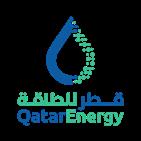
goals. CCS is complementary to renewables, to energy efficiency solutions and to the other available levers and is central to avoiding CO2
emissions from highly energy-intensive sectors that currently have no technological alternatives for decarbonization”.
QATARENERGY WINS WORKING INTEREST IN NEW BRAZILIAN OFFSHORE EXPLORATION BLOCK
Brazil’s National Agency of Petroleum, Natural Gas, and Biofuels has granted QatarEnergy the Agua-Marinha Production Sharing Contract (PSC) as part of a partnership with TotalEnergies and Petronas (ANP).
In accordance with the PSC and related agreements, QatarEnergy will hold a 20% working
CHEVRON

stake, while operators Petrobras, TotalEnergies, and Petronas Petroleo Brasil Ltda. will each hold 30%, 30%, and 20% respectively.
Commenting on this occasion, His Excellency Mr. Saad Sherida Al-Kaabi, the Minister of State for Energy Affairs, the President and CEO of QatarEnergy said: “We are pleased to achieve
this latest successful joint-bid, which adds further highly prospective acreage to our upstream portfolio in Brazil, and particularly in the prolific Campos Basin.”
CHEVRON, BASELOAD CAPITAL ANNOUNCE JV TO EXPLORE GEOTHERMAL DEVELOPMENT
OPPORTUNITIES
Chevron Corporation, through its Chevron New Energies business, and Baseload Capital have declared a joint venture (JV) to develop geothermal projects in the United States. The two businesses will work together to advance geothermal potential, including figuring out which areas have the highest chances for growth and
SHELL
operation, as well as moving the next wave of geothermal technology from the pilot stage to the commercial stage.
According to the company’s statement, geothermal energy offers a baseload, dependable electricity and will be a crucial component in
creating the energy systems of the future. Geothermal power offers a dependable source of renewable energy that will also enable other lower carbon solutions, according to Chevron and Baseload Capital, who believe that all sources of energy will be needed to achieve a lower carbon future.
SHELL TO SELL NON-OPERATED INTERESTS IN MALAYSIA’S BARAM DELTA
Petroleum Sarawak Exploration & Production Sdn. Bhd. (“PSEP“) and Sarawak Shell Berhad (“SSB”), both subsidiaries of Shell plc, have reached an agreement for SSB to sell its interest in two offshore production sharing contracts (PSC) in the Baram Delta. Both the Amended 2011 Baram Delta EOR Production Sharing Contract (“BDO PSC”) and the SK 307 Production Sharing Contract
BAKER HUGHES

(“SK307 PSC”), which each include non-operated interests of 40% and 50%, respectively, are up for sale. The remaining interests in both PSCs are held by the operator, PETRONAS Carigali Sdn. Bhd. (“PCSB”).
The deal has a $475 million base consideration, and extra payments of up to $50 million could
be made between 2023 and 2024, depending on commodities prices. With a projected completion date of early 2023, the deal will go into effect on January 1, 2023, pending the fulfillment of certain conditions, including, among others, obtaining regulatory approval from PETRONAS and PCSB.
SNAM, BAKER HUGHES COMPLETE FIRST TRIAL FOR THE USE OF HYDROGEN AS FUEL IN A GAS COMPRESSION STATION
At one of its natural gas compression units in Istrana, Italy, Snam performed a series of tests in November that were intended to explore the use of hydrogen as a fuel to power gas turbines.
The experiment, which was the first of its kind globally and carried out in collaboration with
EXXONMOBIL
Baker Hughes, an energy technology company, demonstrated the compatibility of the various assets with the use of a blend of hydrogen (at 10%) and natural gas.
The Istrana facility is one of 13 compression stations along Italy’s gas transportation network.
These stations are used to enhance gas as it passes through pipes to various consumption points throughout the nation. The Baker Hughesdesigned and -built NovaLT12 turbine, which is “hydrogen-ready,” has been placed in this country’s first compression facility.
EXXONMOBIL’S CORPORATE PLAN TO POTENTIALLY DOUBLE EARNINGS, CASH FLOW, INCREASE EFFORTS IN LOWER-EMISSIONS
ExxonMobil declared its next five-year corporate plan, with a significant increase in investments aimed at emission reductions and accretive loweremission initiatives, including its Low Carbon Solutions business. The business plan is for maintaining yearly capital expenditures between $20 and $25 billion while increasing investments in lower-emission technologies to around $17 billion.
In the Upstream and Product Solutions businesses, this disciplined strategy emphasizes high-return, low-cost-of-supply assets and supports initiatives to lower the intensity of greenhouse gas emissions from operating assets as well as those emitted by other businesses.
By 2027, earnings and cash flow potential are predicted to have increased by twofold compared
to 2019. The plan also supports the company’s strategic priorities, which include setting the standard for safety, shareholder returns, earnings and cash flow growth, cost and capital efficiency, and greenhouse gas emission intensity reductions.
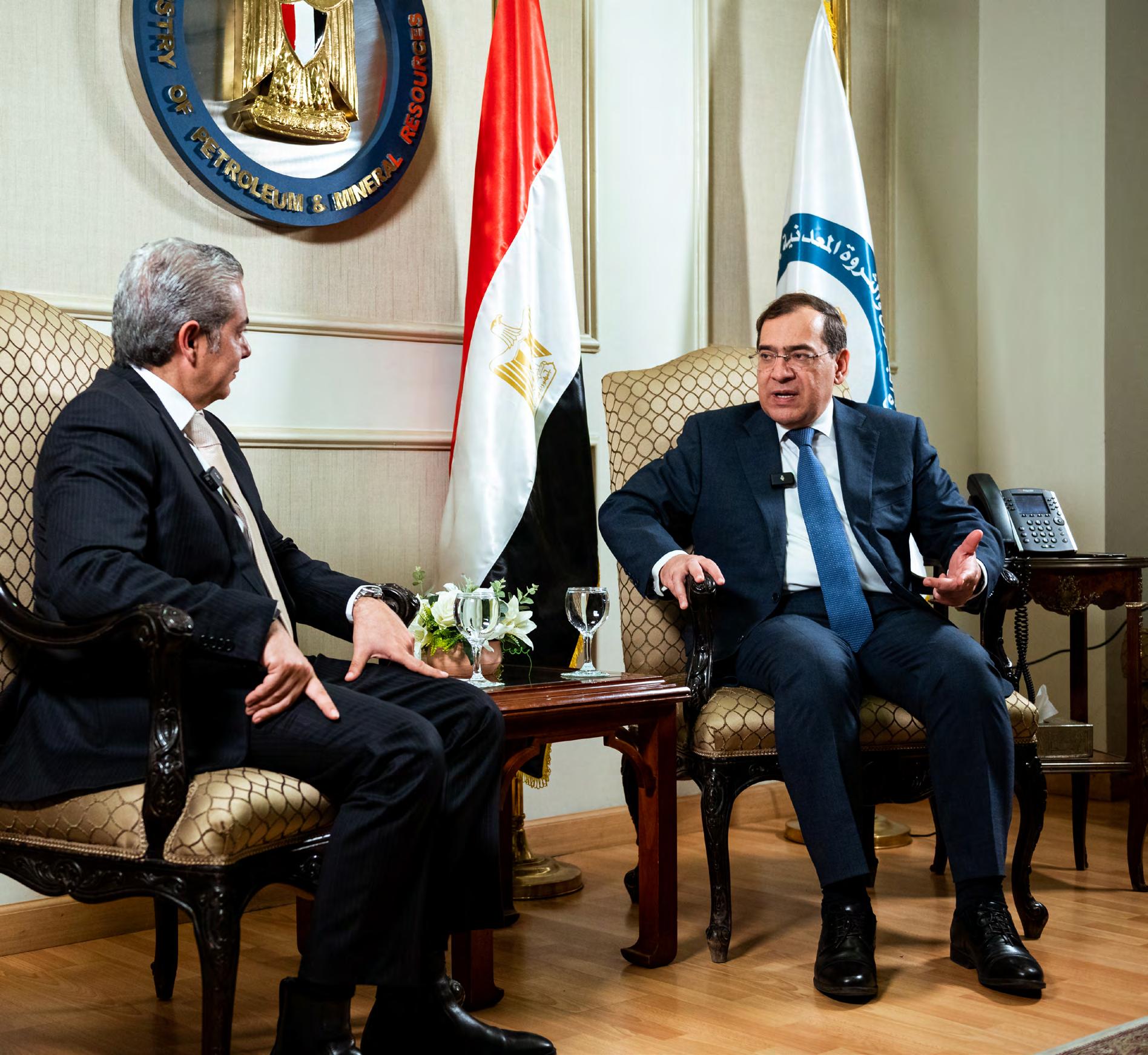
As we start this new year, could you give us a brief overview of how you see the results of 2022 and are you satisfied with the results of 2022?
First, I would like to say that this annual interview is an interview that I am always happy, proud and waiting to have with the Egypt Oil & Gas Newspaper and I would like to start by wishing you and the entire sector all the best wishes for the New Year 2023.
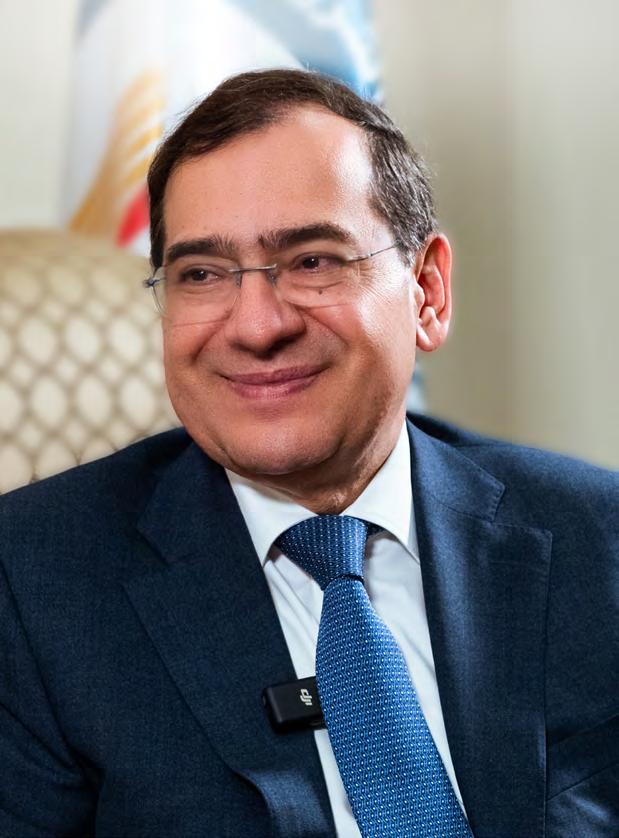
I would like to say also that definitely 2022 was a challenging year and perhaps you know that the entire world is facing geopolitical challenges, especially with the Russia-Ukraine war, and seeing the oil prices and all the commodities getting more expensive and getting tough to receive. Meanwhile, we have seen challenges in the entire supply chain value and then this has reflected, of course, in economies and trade.
When we talk about Egypt, definitely we are part of this international challenge and our oil & gas industry is part of the world energy industry. Therefore, I would like to see it in a different way of how we were able to perhaps withstand and overcome these challenges.
First, I would like to say proudly, that we have been able to ensure that all the needed supplies to the local market are there and that we've been able to satisfy the needs of consumers, whether they are individuals, motorists, industries, or households.
Meanwhile, we were able also in these challenging times as well to increase our exports and when we talk about exports here, we talk about gas exports, especially LNG. We are trying to maximize them and we have been able to successfully reach more than 8 million tons of LNG exports, which is a good number compared to the exports in the previous year which was less than 7 million tons. This year we will try to increase this figure hopefully to exceed 8 million.
Of course, when we say that we've been able to increase our LNG exports, that means that we've been able to increase our revenues and for the first time, we've been able to surpass the $7.5 billion of revenue generated from our LNG exports plus some natural gas exports that we are exporting through pipelines to Jordan.
We were also able to maintain being attractive to our partners. We've been able to attract more investments in upstream activities and especially of course for exploration and development of natural gas.
Offshore activities were very well planned with our strategic partners, and we have a very important and aggressive exploratory drilling campaign, which started mid-2022 and is being extended and expanded till the end of 2023 and 2024, through which we will be able to drill more than 31 wells, important exploratory wells in offshore west and east of our Mediterranean exclusive economic zones. Perhaps one of the important results that we have had is the discovery of a gas field called Narges in association and partnership with Chevron. Yes, we have not yet announced the details of this discovery. However, the Narges discovery, I would say, is the first among several discoveries to come. And we are very optimistic that this will bring and will carry good luck in the coming drilling of wells that are planned in the coming few months.
When we talk about the downstream activities, which are important to satisfy domestic needs. We were able to cover the needs for gasoline and diesel. We were able to continue our ambitious plans to connect more than a million additional households to the natural gas grid. We have now more than 14 million households connected to natural gas. This is, of course, directly reflected in the decrease in subsidies to LPG.
The LPG cylinders are heavily subsidized and we are importing more than half of the consumption. We see it decreasing year after year in spite of the increase in population. When we started like 4-5 years ago with this aggressive plan of connecting more than a million households per year, we've seen it reflected in the imports and consumption of LPG that decreased from 4.2 million tons per year to now 3.6 million tons per year.
Meanwhile, we are continuing on having our important refinery campaign. Despite challenges by interruptions that we had in supply chain of receiving different parts and important components of some projects, whether in MIDOR Refinery in Alexandria or in the Assiut complex that we are constructing now, both of them are being carried out, so by end of 2023 will have MIDOR fully completed and in operation and this will add 60% of its capacity. It will add more diesel and gasoline refined volumes to the market, the same as for Assiut Refinery ANOPC that will be completed by the end of 2024. In spite of the challenges, we were able to have financial closure for the Assiut refinery, which was an important milestone that we've been able to conclude.
In the meantime, most of our retail sites, terminals and depots are being upgraded. We are also using technology to digitalize all facilities, refineries, terminals, and retail sites and they are all connected to EGPC. We are upgrading our refining process through using the linear programing systems and they are
We have been able to successfully reach more than 8 million tons of LNG exports, which is a good number compared to the exports in the previous year which was less than 7 million tons.
all now connected to our SAP, and this is the new phase that we are doing now.
On the international level, we have been able to pursue the growth of the role of Egypt as a gas hub. Under the EMGF, we have been able to sign an important agreement with the EU and Israel. After that, we had an important and very significant breakthrough when succeeding in having one of the thematic days during COP27, which Egypt hosted in Sharm El Sheikh. We were able to have Decarbonization Day for the first time ever, and through Decarbonization Day, we were able to host and to have all the energy companies, especially the oil and gas, and all the international organizations, financial organizations, and other world organizations to attend, witness, and participate during this day. We were able to convince the entire world that we need to be part of the solution since we have been accused of being part of the problem of global warming, and emissions. We were proud to have this important thematic day, and I think this was an important event that I would say internationally was a good closing to the activities that we had. So, in summary, I think the year 2022, in spite of the global challenges, Egypt’s oil and gas industry has been able to have a good and successful year and [was] very well recognized internationally as well.
What would you like to see achieved in 2023?
In 2023, we will be continuing what we have done, to complete and to achieve the projects that we have opened or we started a few years ago and we wish to conclude in 2023. Meanwhile, I would like to see more and more improvement in energy efficiency. Energy efficiency has been an important target for our sector, and an important KPI that I hold all my companies accountable for achieving. Why am I focusing on that? It’s because energy efficiency will allow us to save costs, enable more efficient production, and thirdly, which is more important, help us save more natural gas, which we will be able to export and generate more revenues from.
Secondly, I would like to see and hope to have more discoveries, and I think we have important drilling campaigns that will be run during 2023. For most of them, we are just crossing our fingers and praying to God to send us some resources, and these drilling campaigns would realize good discoveries hopefully God Willing. I think with that I would say that this would be translated then to quick projects in order to bring these discoveries to production as early as we can. Definitely, we feel and are very much aware of our responsibility towards the Egyptian economy and how our oil and gas industry is an important pillar of the Egyptian economy. Therefore, we are really doing our best and our utmost in order to improve the revenues, reduce our costs, and generate more foreign currency for our economy.
Concerning 2023 also, what would be your key message that you would like to deliver to the international companies operating in Egypt?
With the success stories that we had with our strategic partners and our IOCs operating in Egypt, I think that we have gained more and more credibility. I think that they have seen me close to them, being all the time engaged in all the different topics, activities, challenges, and solutions. With that, I will just still reiterate the importance of confirming their commitment, and confirming their engagement, and their growth in Egypt.
I think it’s clear that their growth in Egypt will pay off. With oil and gas high prices, I think that this is the time for them to explore more, discover more,
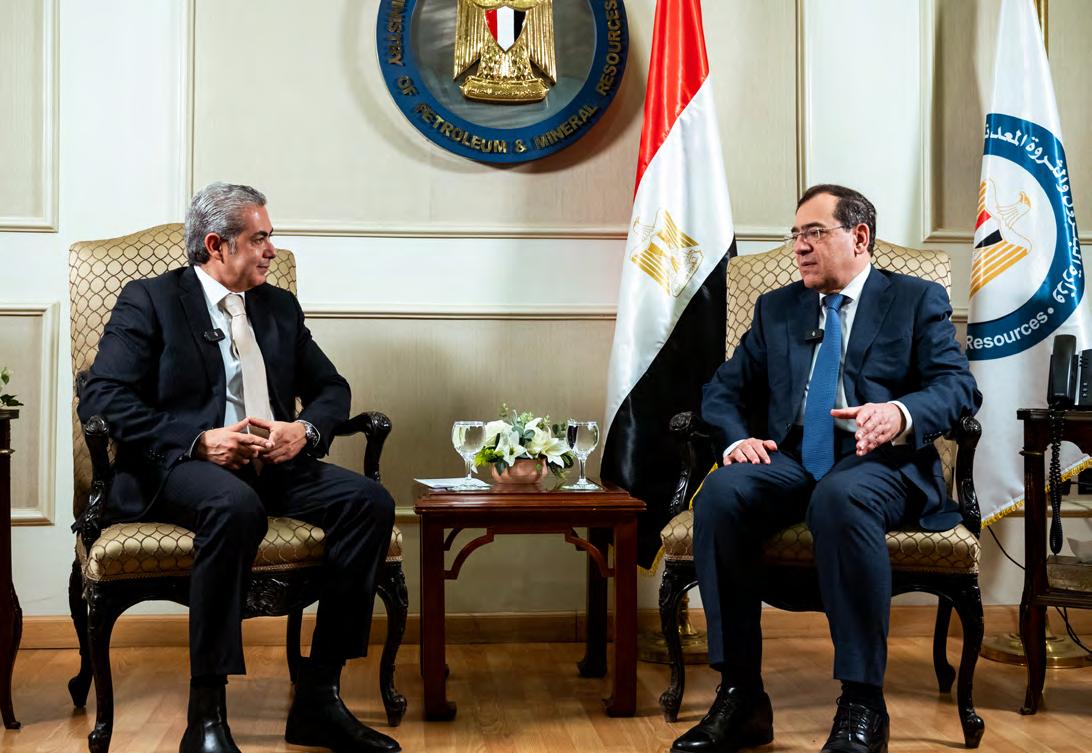
The Narges discovery, I would say, is the first among several discoveries to come. And we are very optimistic that this will bring and will carry good luck in the coming drilling of wells that are planned in the coming few months
develop more and produce more, so that we will be both in a win-win position.
We, as energy companies and as the energy industry, are all aware and committed to the transition, and we are with less emissions, but we also with more production.
So, this is what I would like to ask my partners: Please stay committed, grow your business, grow your activities, and I am there, the government is there, the leadership of the country is there, we will definitely support you all the time, and I think is our window of opportunity. We have made a good representation during COP27. I think we are up to this responsibility and we can deliver good hydrocarbons with less emissions, and will be able to gain some good revenues for our companies and our people. So, this is my message, wishing them all the best for the year 2023.
Since you took the role as the Minister of Petroleum, there has been a huge success when it comes to corporate social responsibility (CSR). What are your plans for corporate social responsibility with international oil companies as partners within this plan?
Well, I saw over the years that we have through our companies, whether they are state companies, joint ventures, or international companies operating in Egypt, good will, good contributions, and good budgets towards CSR and social responsibility. However, I've not seen it reflected positively in society because these amounts and these initiatives and these social corporate
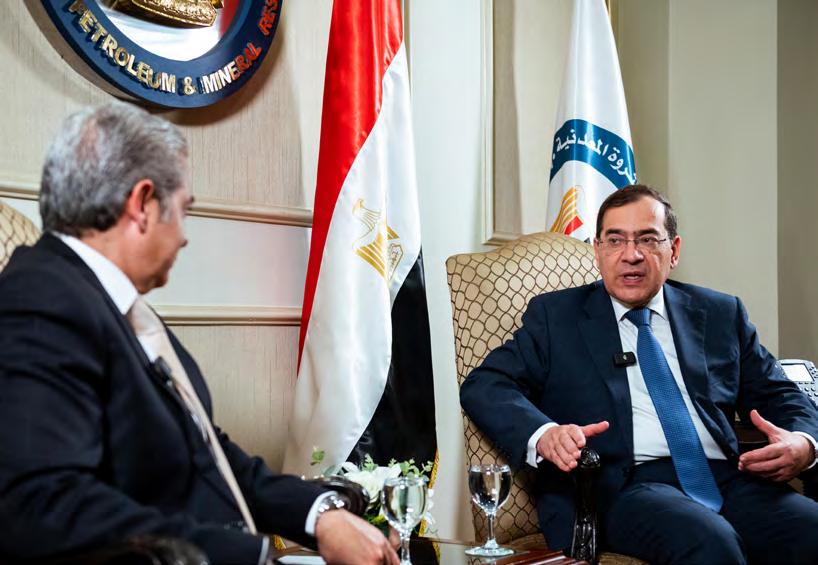
have been accused of being part of the problem of global
responsibility projects that had been made were scattered and fragmented and they have not been sound enough to the level where the community would appreciate.





Therefore, I created last year a committee headed by myself to give it credibility and to give a message of importance, and value to the message that I would like to deliver. This committee witnessed the participation of all companies and we did put together, based on International sustainable development goals (SDGs), the priorities that we can implement in Egypt.
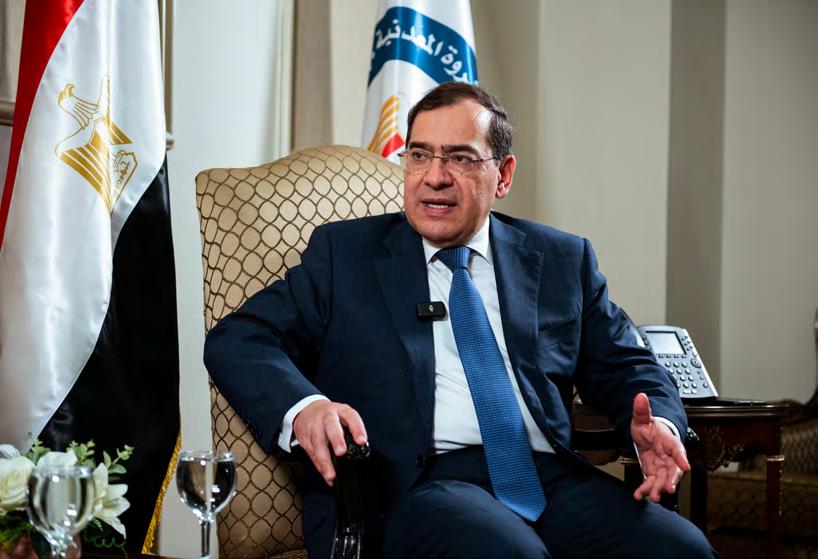
We are prioritizing, of course, education projects. And when we talk about education, sometimes also we talk about girls’ education, and of course about health, and hospitals, specially, when we go to small cities. Therefore, I think that we have been successfully able to launch this committee and launch several projects. So far, we have not yet reached the level that I want because this was the first year but we have a big plan for 2023.



We have already now put into each company a focal point and a department that is responsible for CSR which has not been the case before. This is part of the culture and this is part of raising awareness of the importance of our role as good citizens contributing to society very important and very positive services that would help the community.

I think with this important initiative, we will see more and more positive feedback and see very sound projects that will make a big difference for our community.
In your opinion, what are the most difficult challenges facing the energy sector in Egypt in the coming year and how will you face them?
The energy industry is essentially a global industry, and the complex challenges it faces and the continuous turmoil as a result of global tensions extends to various countries, including Egypt.
The challenges facing the energy industry since the first quarter of 2022 are represented in the continuous price fluctuations in the oil and gas markets, the accompanying increase in operational costs, supply chain crises as a result of global tensions, as well as the difficulty of predicting market directions and prices. It is expected that these price fluctuations and uncertainty in the energy markets will continue during the year 2023, especially with the expected global economic recession.
For our part, we are moving quickly on several axes in parallel to reduce the effects of this global crisis on the energy sector in Egypt, which depends mainly on fossil fuels of oil and gas, and limit the impact of high costs on it. Though Egypt is a natural gas exporter, it still imports part of its needs of
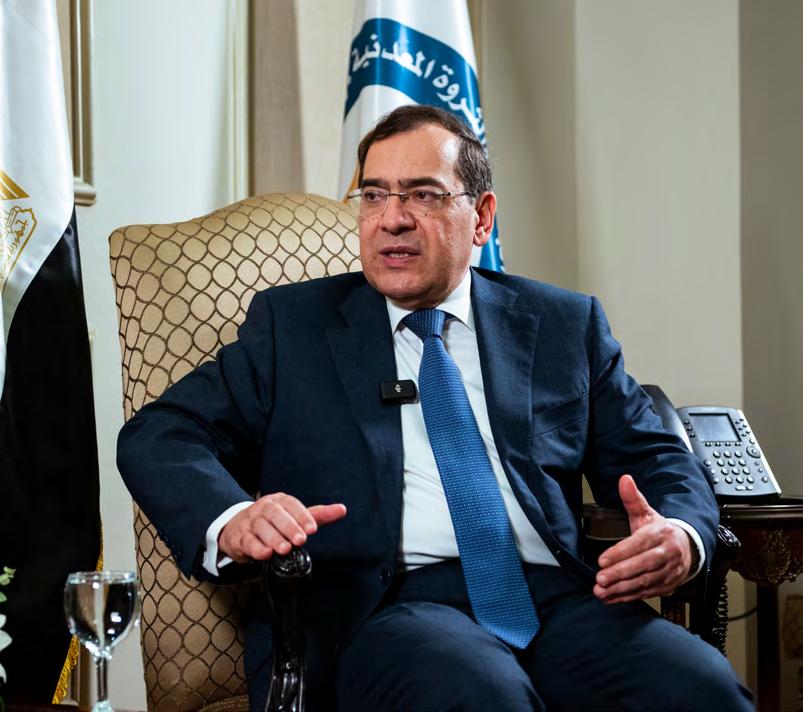
crude oil and petroleum products. Therefore, the financial burdens of these imports represent a challenge that is faced by working to intensify the search and exploration for gas and oil in order to increase reserves and production from them and provide additional local production that helps us reduce imports, as we launched an expanded program for exploratory drilling in the Mediterranean to access latent reserves and increase our gas resources.
We are also working on measures to maximize the utilization of energy resources through the rationalization of consumption and rationalizing the use of energy through proper pricing, in addition to benefiting from technology to raise energy efficiency, which preserves our resources, and there is a future strategy launched in November 2022 during the Climate Summit to achieve energy efficiency. We have started implementing it since 2022, and its term extends to 2035. We also continue to work on the completion of petroleum refining and manufacturing projects, foremost of which are the expansions of the MIDOR refinery and the ANOPC complex in Assiut to secure the availability of petroleum products needs locally and thus gradually limit their import. There is no doubt that enhancing the capabilities and development of the refinery system is very important in light of the problems of supply chains and the huge surge of petroleum product prices globally. All of these axes come within the strategy of the sector’s work to face global challenges.
In light of environmental and geopolitical challenges, how can we achieve a sustainable and responsible energy transition?
The process of a complete energy transition towards total reliance on clean energies will not happen overnight, as it requires great efforts, huge investments, and an appropriate period of time to implement, test, and operate clean energy projects. Therefore, the process must be implemented wisely and deliberately to achieve the desired results efficiently, and the global challenges witnessed in recent years, especially the Russian-Ukrainian crisis, have proven that the world still needs traditional energies in light of the growing demand for them and the inability of clean energies yet to provide the fuel necessary for the continuity of life activities of all kinds at reasonable prices. Here is where the importance of natural gas emerges as the best fossil fuel with environmentally friendly characteristics, and it was chosen as the main transitional fuel on the pathway towards a complete energy transition.
This was highlighted during the Climate Change Conference (COP27), which was hosted by Egypt in Sharm El-Sheikh last November, where the Ministry of Petroleum and Mineral Resources, local and international oil and gas companies, and organizations and institutions concerned with industry participated in the activities of the conference for the first time in the history of climate conferences.
I think we are up to this responsibility and we can deliver good hydrocarbons with less emissions, and will be able to gain some good revenues for our companies and our people. So, this is my message, wishing them all the best for the year 2023.
We feel and are very much aware of our responsibility towards the Egyptian economy and how our oil and gas industry is an important pillar of the Egyptian economy.
The Russian-Ukrainian conflict could be considered both a challenge and an opportunity. How can Egypt confront these challenges and benefit from the opportunities that it could offer?
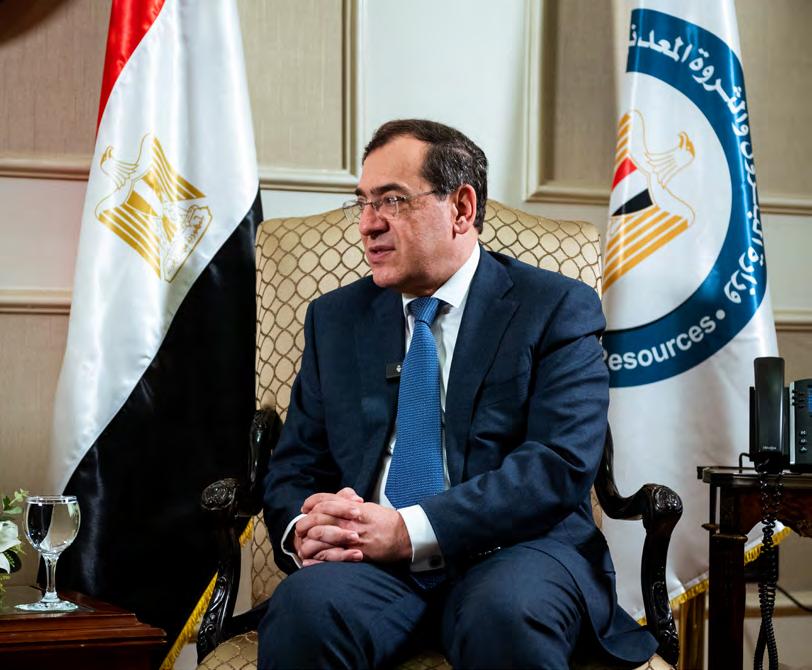
As we elaborated, we are dealing with these global challenges through an integrated vision, which includes the expansion of discovery and exploration activities, accelerating the development of fields to increase reserves, implementing energy efficiency, modernizing the refinery industry, and maximizing the utilization of infrastructure to export natural gas, which is an important competitive advantage of Egypt in the region.
This is a very important solution that can make opportunities out of challenges. Amid surging regional and international demands to secure natural gas supplies, Egypt is one of the quick solutions which contribute to meeting a part of this demand, considering its key role in being a hub for trading and transporting natural gas as well as the great capacities that it has in its Idku and Damietta liquefied natural gas (LNG) plants. These plants allowed Egypt to receive natural gas from the East Mediterranean fields and re-export it to outside markets, especially the European market.
Also, since Egypt achieved self-sufficiency in natural gas, it is exporting the surplus of its production and it is working continuously on securing a great amount of natural gas from the East Mediterranean to re-export it. The exporting capacity from Idku and Damietta plants reached 12.5 million tons of LNG annually, while we are currently exporting more than 8 million tons.
The Ministry of Petroleum and Mineral Resources has taken a special interest in developing human capacities. What are the plans for developing the talents and capabilities in the sector?
No doubt that the young cadres are the main element in the targeted developments and they represent future hopes to guarantee that the petroleum sector will continue achieving progress in the coming period to support the national economy.
When we launched the Modernization project in 2016, we were keen on dedicating a program to develop human capacities and qualify young and middle management. Last year, the second phase of the program was completed, in which 831 of the applicants underwent the final assessment and 416 were chosen to join the unified training phase. Moreover, 282 training programs on energy efficiency were offered to more than 275 trainees.
In addition, a program for building capacities in operational safety and assets integration teams was offered, in which 150 candidates were selected during the final evaluation phase of the second edition of the program and the training programs are under preparation according to the latest practices in the field of operation safety and assets integration. Furthermore, a set of memoranda of understanding (MoUs) were signed with major international petroleum companies to sponsor different training programs in its coming phases.
For empowering youth cadres, a plan was set aiming to empower distinguished cadres from the best graduates of the capacity-building programs to benefit from them in all oil and gas activities. A group of cadres were chosen to work on new strategic projects in the sector such as Egypt Upstream gateway (EUG), the sector’s restructure project, modernization and digitalization work teams.
Egyptian is a country which has been blessed with rich mineral wealth. How has the Ministry worked to take full advantage of that in 2022?
The ministry continues to implement work plans and programs as part of the mining sector’s development strategy, which aims to attract investments and
enable its strong contribution to national production through an integrated system of procedures to modernize the methods of mining work and maximize the value-added of mineral raw materials. This can also be achieved by benefiting from production facilities and distinguished expertise in this field as well as Egypt's possession of very important mining areas in the Eastern Desert region.
On May 26, 2022, the results of the second round of bidding for gold and its associated minerals, which was launched in March 2020, were announced with English, Egyptian and Canadian companies wining eight sectors in the Eastern Desert.
The result of the bidding associated mineral ores search (iron, phosphate, copper, white sand, feldspar, etc.) was announced in several sections on an area of 16 square kilometers, where nine Egyptian companies won a total of 11 sectors of raw materials (phosphates - white sands - kaolin).
In July 2022, The Egypt Mining Forum was launched in the presence of more than 200 participants from the heads of Egyptian, African and international mining companies.
We are also working on measures to maximize the utilization of energy resources through the rationalization of consumption and rationalizing the use of energy through proper pricing, in addition to benefiting from technology to raise energy efficiency
We have also work to develop human cadres with training program for workers in mineral resources was completed within the comprehensive training program that was designed for the trainees and the employees of the Egyptian General Authority for Mineral Resources to benefit from it in stages of various disciplines, and they were divided into four groups, where the training of all groups, which included 303 employees of the Egyptian Authority, was completed. The General Authority for Mineral Resources aim to raise the contribution of the mining sector to the GDP from 0.5% now to 5% by 2030.
Participation in the International Mining Conference in the Saudi capital, Riyadh, last January, where El Molla presented the Egyptian vision to attract investments to the mining sector and take advantage of mining opportunities and resources in the optimal economic manner.
About 568,000 ounces of gold and silver were sold during 2022, which represents a 17% increase in comparison to 2021, and the total value of their sales amounted to about $878.24 million, and the value of the due royalty (3%) is about $26 million.
About 9.5 million tons of mining products and raw materials were produced during the year, which represents an increase of about 50% compared to 2021.
Thank you so much your excellency. And I would like to end this interview, in a different way. Were you able to watch the World Cup?
Yes. Well, I was able to watch most of the important matches, all of them are important, definitely, I mean semifinals, quarter-final and final of course. I was also lucky that I had the chance to attend some of these matches in Qatar I was there at the quarter-finals. I have been able to watch two of them and to witness the development that has happened in Qatar and how the Qatari government was able to host such a global important event by which we were really very proud that an Arab country was able to manage, host, and facilitate a very successful event, like the World Cup.
The process of a complete energy transition towards total reliance on clean energies will not happen overnight, as it requires great efforts, huge investments, and an appropriate period of time to implement, test, and operate clean energy projects.
Egypt's refining and petrochemical industries play a dynamic role in the Egyptian economy. The Egyptian petrochemical industry is considered as one of the most vital strategic industries on which many complementary industries are based, and it has a direct impact on supporting the national economy. On the other hand, the refining industry also has a significant economic contribution, as it represented 3.5% of the total gross domestic product (GDP) in FY 2021/22, with an increase in its GDP by 19.6% compared to fiscal year (FY) 2020/21, according to the Ministry of Planning and Economic Development (MPED) data. This reflects the adopted efforts to improve Egypt's downstream performance which directly affects the value chain of the oil and gas sector.
REFINING SECTOR
In 2016, the Egyptian Ministry of Petroleum and Mineral Resources (MoP) adopted a strategic refining policy through the vision of the modernization program combined with the implementation of the economic reform program in Egypt. This policy aims at expanding the refinery infrastructure, including developing new refineries and upgrading the existing ones in Egypt. Hence, this has achieved distinct results over the period (2016-2021) in raising the refining production capacity by 13.6% and promoting refineries’ production by 17.3%, according to the Organization of the Petroleum Exporting Countries (OPEC) data.
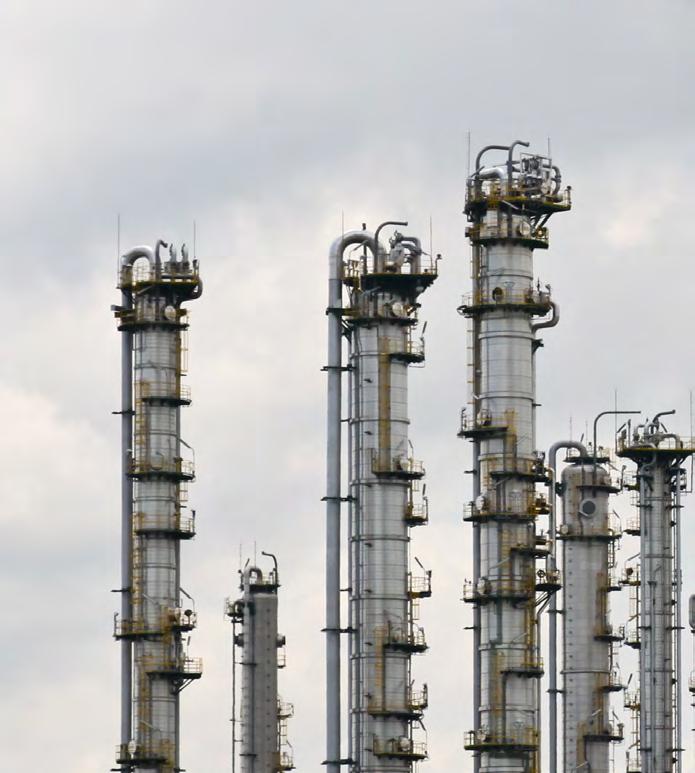
PETROCHEMICALS SECTOR
Egypt paid attention to the petrochemicals industry as one of the most strategic industries which has a direct impact on supporting the country’s economy. The petrochemicals industry has witnessed remarkable progress during the last seven years, and is expected to increase the added value of products. In this context, the integrated plan implemented by the petroleum sector has a great role in increasing the capabilities of the petrochemicals industry through a set of new ambitious projects. The local production exceeded 4.3 million tons per year (mmt/y) in FY 2021/22, which doubled from around 2.1 mmt/y in FY 2015/16, stated in the general assembly of Egyptian Petrochemicals Holding Company (ECHEM).
EGYPT'S NATURAL GAS PERFORMANCE PROMISES ENERGY RESILIENCE IN 2023
BY SARAH SAMIRIn the past year, Egypt has been proving that it is able to compete in the natural gas market and develop its hydrocarbon production amid a global energy crisis. Despite the shortage and turbulence in the energy markets, which is affected by the Russian invasion of Ukraine, Egypt's energy performance has been going strong throughout 2022, with expectations to boost natural gas exports and ensure energy security in 2023.
Natural Gas is the Future
The past year has shed light on the importance of natural gas. Although the world plans for an energy transition, it is not realistic to stop using hydrocarbons at this stage. When the turbulence between Russia and Ukraine took place, many occurrences indicated that natural gas is essential for many countries' survival. At this stage, the world does not have yet the finance or means to only produce energy from new and renewable resources. Therefore, energy leaders have considered natural gas as the safest transitional option for the time being.
As Europe is looking for alternative gas suppliers, other than Russia, Egypt comes to light thanks to its location and infrastructure that enables the country to be a natural gas trading hub. This comes as Egypt already has a surplus in its natural gas production, in addition to the two gas liquefaction plants in Idku and Damietta. These plants enabled Egypt to seal several deals with neighboring countries to liquefy natural gas in Egypt in order to be able to supply liquefied natural gas (LNG) to the European markets.
2022 in a Brief
In 2022, many developments have boosted Egypt's oil and gas potential. "Egyptian gas has played a role in securing Europe's energy needs," Minister of Petroleum and Mineral Resources, Tarek El Molla, told Reuters at an East Mediterranean Gas Forum (EMGF) conference in December. "The liquefaction units are now operating at full capacity as we try to maximize our natural gas exports in light of the rise in international gas prices," El Molla explained.
In 2022, Egypt's oil and gas exports saw progress breaking a record as it reached 8 billion tons of gas, compared to 5 billion tons in 2021. Hence, the exported gas in 2022 was worth $8.4 billion, compared to $3.5 billion worth of gas exports in 2021, making a 171% increase year-on-year (YoY).
Moreover, 2022 witnessed positive production figures for petroleum resources. This comes as Egypt produced about 27.8 million tons of crude oil and condensate, around 50.6 million tons of natural gas, and 1.1 million tons of butane, in addition to butane produced from refining and manufacturing refineries.

In 2022, Egypt successfully hosted the COP27 climate summit, in which a Decarbonization Day was organized for the first time in the summit, allowing oil and gas leaders to contribute to climate action talks.
Moreover, Egypt has signed several memoranda of understanding (MoUs) with energy partners to develop green hydrogen to have another clean energy source available in order to enhance the country's energy sectors.
2023 Outlook
The year 2022 has several developments and good performances that promise good outcomes in Egypt's hydrocarbon industries during 2023. "In 2023, natural gas markets are expected to remain tight with European and Asian demand absorbing the incremental LNG export volumes coming online," according to Deloitte's 2023 Oil and Gas Industry Outlook.
Accordingly, several countries are taking measures to ensure energy security in the coming years. "Several natural gas exporting countries have announced that they are boosting natural gas production, including Qatar and Israel via Egypt," Deloitte's outlook explained.
Egypt plans to boost its natural gas exports in FY 2022/23. "We aim to reach $1 billion per month over the next year," Egyptian Finance Minister, Mohamed Mait, pointed out.
In 2023, Egypt does not only look to boost natural gas exports, but it also is working on decarbonizing this produced gas to be environmentally safe and to be competitive in the gas market. Moreover, Egypt is also working on diversifying its energy source to ensure energy security as the country is partnering with industry leaders for green hydrogen and blue hydrogen projects and is encouraging renewable investments.
The outlook for Egypt's energy sectors in 2023 is promising with the achievements made in 2022 and with the energy markets' current potential. As the geopolitics of the energy markets are hugely affected by the recent crises, Egypt is working on developing its natural gas production and joining the competitive global markets with expectations to further boost its exports in 2023.
In 2022, Egypt's oil and gas exports saw progress breaking a record as it reached 8 billion tons of gas, compared to 5 billion tons in 2021.

TO PHASE-OUT OR TO SUBSTITUTE: THAT IS THE QUESTION
BY RANA AL KADYWhy do oil and gas sources need to be entirely cut out? What consequences could arise from a complete halt of these fossil fuels? Are renewable energy technologies ready to carry this load overnight? Other than the known issue of increasing carbon emissions, the oil and gas industry is starting to feel the heat to reduce the impact on climate change by mitigating their respective carbon dioxide footprint. The global community has not been able to come together to stop using fossil fuels. However, there are a couple of middle-ground solutions: phase-out and/or substitutes.
While the deal text of COP 27 called for efforts to phase down use of unabated coal power and phase-out inefficient fossil fuel subsidies, some countries had pushed to phase out, or at least phase down, all fossil fuels. However, while some may see this as harsh and impractical, other oil and gas experts are suggesting having less carbon-intensive oil and gas fuels instead (ie. Natural gas).
General Overview
Firstly, according to the International Energy Agency (IEA), there is no place for the construction of new oil and gas projects if we are to keep global warming to 1.5°C; the oil and gas projects that are currently in operation or under establishment could meet the current necessary demand.
In light of the market prospects, the Paris Agreement makes it obvious that the speed of nations' actions to reduce emissions would change. Additionally, it was suggested during recent talks that the wealthier nations could fund and offer various forms of assistance to help poor nations make the shift.
Because of the gravity of the situation, equality can no longer be handled just by varying the intensity and timeliness of mitigation activity among nations. Even though wealthy nations move more quickly, lower-income nations that largely rely on oil will require a significant increase in climate financing in order to completely transform their economy in much less than three decades.
Phase-Outs
A speedy and fair phase-out of all carbon fuels, including oil, gas, and coal, is seen as the only way to achieve environmental objectives, avert the very worst effects of climate change, prevent fossil fuel deadbolt, and prevent stranded assets, notwithstanding the work on creating a loss and damage reserve. A draught conclusion at the COP27 event, following weeks of discussions, offered a "compensation fund for climate change damages" but stops flat on the Western desire for a phase-out of petroleum sources. The question becomes, ‘If we can actually aim to phase-out oil and gas fuels by 2030, how fast should this process be, and should all countries have the same goals?’
According to the International Institute for Sustainable Development (IISD), Canada and The United States of America, have the same goal to phase-out oil and gas sources by 2030 by 74%, and eventually all oil and gas should end by 2034. On the other hand, in developing nations such as Angola or Nigeria, the goal is to reduce oil and gas sources by 14% by 2030, while eliminating oil and gas sources over a longer period of time, by 2050. Egypt stands in between both extremes with a goal of reducing oil and gas sources by 18% by 2030 and eliminating all oil and gas sources by 2045.
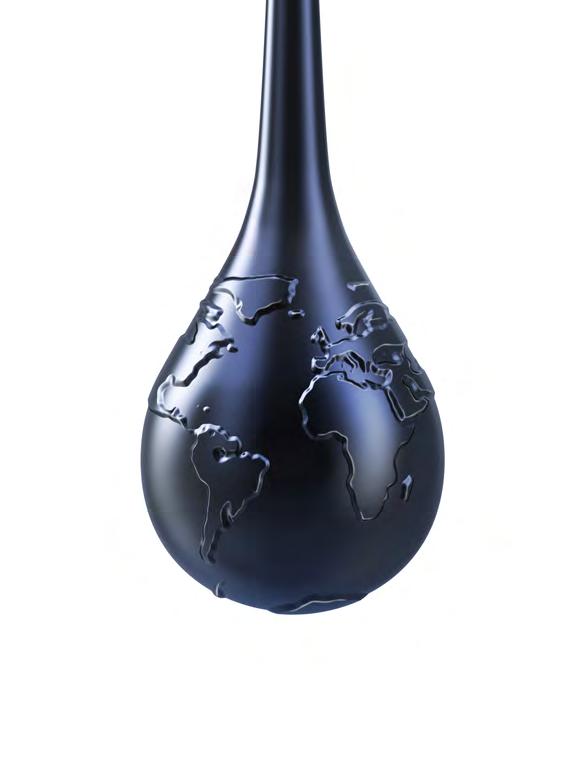
Thus, as suggested by a Sustainability Manager in the Renewable Field, “We [Egypt] must aim to limit as much as possible uses of fossil fuels and make a fast shift to sustainable energy with the help of the people and government bodies. Personally, I believe
to stop using all of the oil and gas now is hard and impossible and [damaging to the economy].” Hence, another alternative is suggested as a middle-ground solution: substitution.
Oil & Gas Substitutes
Additionally, the problem with using hundreds of hundreds of millions of litres of fuel is that there isn't a quick substitute for traditional fuels like crude oil and probably won't be for a while, especially as global energy demand rises. Natural gas, wind, solar, nuclear, and biofuels have made progress against oil which emits greenhouse gases, but there remains a considerable distance to go before these affordable, effective power sources can be phased out.
Since it burns cleanly and is widely available around the world, natural gas may also be a useful replacement for oil and petrol. Despite being categorized as a fossil fuel, natural gas may be utilized as an alternative fuel because it is a renewable resource. In comparison to petrol and diesel, natural gas has a reduced carbon footprint and is, therefore, more environmentally friendly.
Furthermore, green Hydrogen and other sectors have long used hydrogen. This green hydrogen fuel has been utilized in fuel cells for vehicles, and aircrafts. In fact, international commerce will be facilitated by the development of standardization for the secure transportation and storage of large quantities of hydrogen fuel as well as for assessing the environmental effects of different hydrogen sources.
The oil and gas industry generates huge amounts of data, but the challenge is how to attain useful insights from this data that could increase operational efficiency.

EDGE COMPUTING: A NEW ERA OF OPERATION EFFICIENCY
 BY FATMA AHMED
BY FATMA AHMED
Due to the nature of uncertainty in the oil and gas industry, it is necessary for operators to find solutions to increase production and improve operational efficiency at low costs. This is besides the new urgent need for decarbonizing the industry in order to overcome climate change. At the time of digital transformation, one of the latest new technologies that can play a key role in this regard is edge computing.
The Core Definition
According to Accenture, Edge Computing is an emerging computing paradigm that refers to a range of networks and devices at or near the user. Accenture explained that Edge is about processing data closer to where it is being generated enabling processing at greater speeds and volumes especially in remote areas, leading to greater action-led results in real-time. This enables companies to improve the way they operate and control assets.
Edge Computing has three possible components. The first component is edge devices which can collect and process data like the Internet of Things (IoT) devices and sensors or local edge servers to end-users. The second component is the network edge which does not necessarily exist, but when it is involved, it has to be operated at high speeds with low latency. 5G is the best network working with edge computing. The third one is the on-premises infrastructure in order to manage local systems and connect to the network.
Edge Computing Empowers Oil & Gas
The oil and gas industry generates huge amounts of data, but the challenge is how to attain useful insights from this data that could increase operational efficiency. Also, this data needs to be processed through a low-latency system in order to take decisions in real time. According to STL Partners, just one oil rig can produce over a terabyte of data per day which is the equivalent of 130,000 digital photos. However, less than 1% of this data is analyzed to get useful insights.
Additionally, it may not be accessed in real time because it is sent to remote data centers. Thus, Edge Computing is vital for the oil and gas industry in solving this issue. Edge computing enabled operators to collect data from a wide variety of oil and gas environments of exploration and production like deep wellbores, oil rigs in remote areas, and the intense temperatures of liquefied natural gas (LNG).
Technically, edge computing can save bandwidth, which is expensive when uploading and downloading data to and from the cloud. As mentioned above, it reduces latency as the data is analyzed locally instead of sent or received from the cloud. It also allows data processing when the internet or the cloud connection is damaged. At the operational level, STL Partners said that “edge improves the use of condition monitoring and predictive maintenance which can reduce a huge amount of costs, and time in addition to supporting workers' safety.”
As per decarbonization, Edge Computing plays an important role in this field. It can support “data collection, consolidation, and analysis to improve operationally and hydrogen production efficiencies,” the Schinder Electric blog stated. The Netrality noted that “5G enhances edge computing in the oil and gas industry. It provides realtime tracking of worksite safety conditions in mines, activity monitoring to increase human productivity within oil rigs, tracks the condition of equipment to improve maintenance, uses artificial intelligence to improve operational efficiency, and protects worker health and safety.”
At the time of digital transformation, one of the latest new technologies that can play a key role in this regard is edge computing.
The oil and gas industry generates huge amounts of data, but the challenge is how to attain useful insights from this data that could increase operational efficiency.

Integrated solutions for the fracturing of conventional and unconventional wells
ENERGY MARKETS BRACE FOR A TURBULENT 2023
BY NADER RAMADANEconomists have been pessimistic lately and a quick look at the numbers proves the reason for this. With no sign of the Russia-Ukraine war coming to an end and a recession set to blitzkrieg around the world, global energy markets are in for an interesting rollercoaster ride. But problems have a way of opening doors to new opportunities and if experts can navigate through what’s to come, there is indeed a possibility to make gains out of losses.
Starting with the energy transition, many may perceive the arrival of renewables onto the world stage as the demise of traditional fossil fuels, but experts beg to differ, especially when it comes to this coming year. Extreme weather conditions and hydrocarbon shortages have played in favor of the oil and gas industry with markets turning to fossil fuels to satisfy their immediate energy needs. This, according to the Economic Intelligence Unit (EIU), will be accompanied by modest growth of global energy consumption by 1.3% in 2023 due to slow economic growth and surging energy prices. “With meteorologists forecasting more weather events—including a rare third consecutive year of La Niña—we expect more short-term power crises around the world in 2023,” said the report. “Countries will keep falling back on fossil fuels to cope with such scenarios. China and India, where hydropower accounts for more than 10% of total electricity generation, are most likely to do so. Another example is Brazil, which relies on hydropower for 60% of total power generation.”
Though the energy transition may be backed up, renewable energy is still projected to perform well in 2023. “We forecast that solar and wind capacity addition will remain strong during our forecast period, prompting renewable energy consumption to grow,” said a report from EIU. “Asia is and will continue to be the world’s biggest market for renewable energy investment, with the lion’s share going to China, India, Japan, and South Korea.”
With regards to natural gas, the EIU report stipulates that Asia might be the next market natural gas exporters would need to look into with gas consumption expected to increase by 2.4%, as the region may surpass North America as the largest global market for natural gas by 2027.
Depleting gas supplies will force the consumption of global oil and coal to experience significant growth throughout 2023. The EIU points out that oil consumption will grow by 1.4% with the support of Asian markets but may face difficulties due to the continued European oil embargo on Russian oil as the superpower struggles to bypass the measure by exploring alternative markets.
With decisions of OPEC+ being a dominant factor in global energy prices, Ulster Bank UK indicates that hopes of OPEC+ lifting production caps are farfetched given that demand needs to recover sufficiently.
“After months of steady increases in oil production quotas, in October OPEC+ announced that it would reduce oil production quotas by 2 million barrels per day (mb/d). This was much its largest production cut since the depths of the pandemic and represented a major shift in the group’s strategy,” said Ulster Bank. ”By slashing oil production quotas, OPEC+ was signaling its intention to prevent oil prices from falling much further. We think it is unlikely that demand expectations will recover to the point where OPEC+ will increase production quotas in 2023.”
With Europe being determined to continue its support of Ukraine, Ulster Bank UK indicated that the West will remain firm in its commitment to reduce its dependence on Russia's energy supplies, a policy that will be strictly implemented throughout 2023 as the Russia-Ukraine conflict shows no sign of coming to a close.
“We think the Western transition away from dependency on Russian energy is likely to remain a theme throughout 2023, with a full EU embargo of Russian seaborne crude oil imports […] and a further embargo of refined petroleum product imports due to come into force on 5 February,” said Ulster Bank. “The IEA recently estimated that such bans could take another 1.4 mmbbl/d of Russian crude oil and 1.0 mmbbl/d of Russian refined product exports out of the European market.”
Though the tides of the coming year may be tough, the potential gains from the opportunities that are in the market may be greater. Oil and gas companies have to take measures to increase production to ensure the needs of the market are met while working to decarbonize their operations as a positive contribution to the energy transition. Policymakers also need to adopt measures to ensure that the private sector can work effectively in their business operations while making energy supplies more affordable to their local populations, even if this involves the use of energy subsidies.

Though the tides of the coming year may be tough, the potential gains from the opportunities that are in the market may be greater.
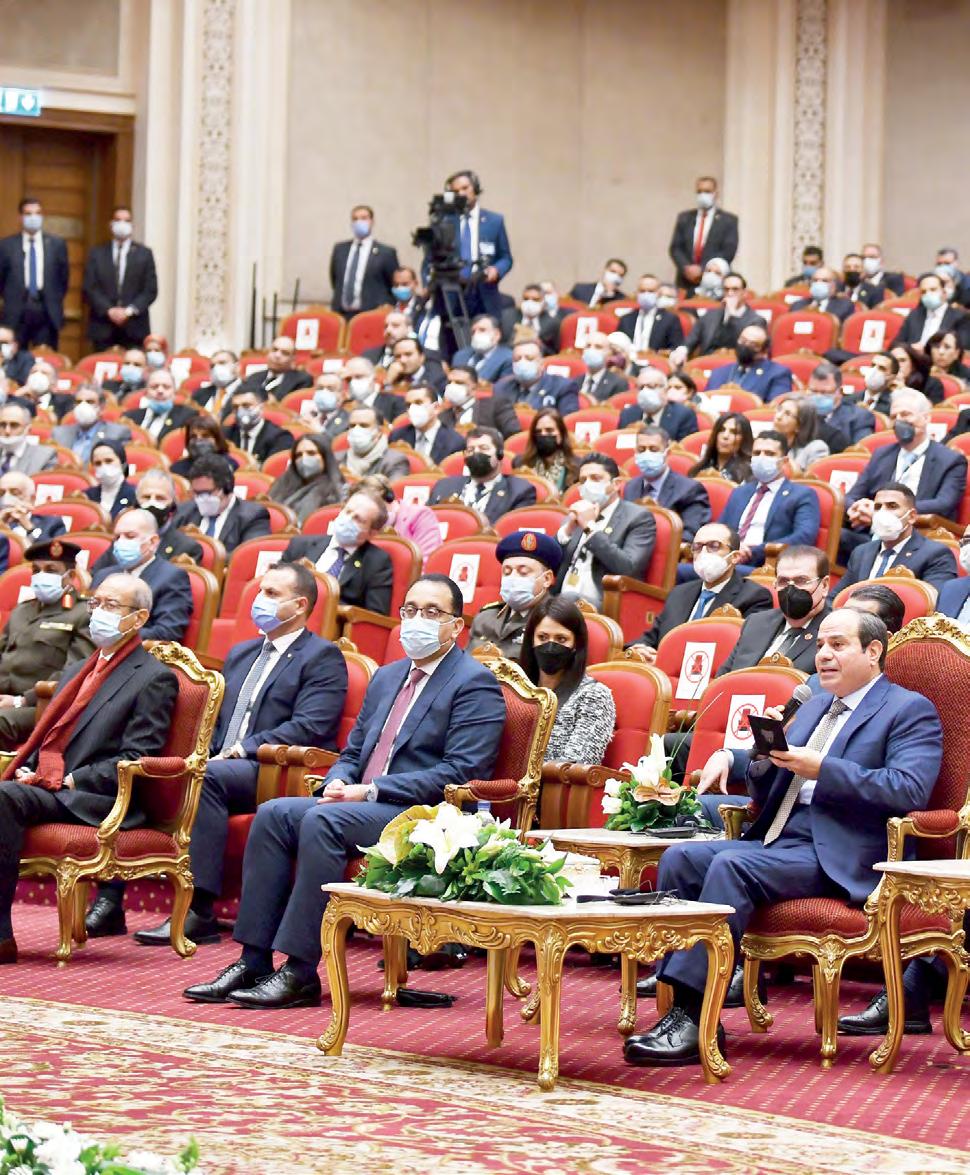

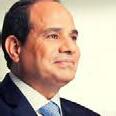



LEGISLATIVE MEASURES TO PREVENT ECONOMIC COLLAPSE IN EMERGING MARKETS

The energy sector is at the heart of the legislation and measures to address the coming global economic slowdown. Various energy sources, especially fossil fuels, are central to economic development for all countries around the world.
The availability of sufficient energy supplies at reasonable prices represents a main guarantee for the continuation of economic and development activities in both major and emerging economies countries alike. Indeed, a shortage of energy supply or a steady rise in energy prices may have ripple effects in different life aspects of life on Earth in general.
There is no doubt that the global price of oil and gas crisis coupled with insufficient energy supplies, has reduced the economic growth rates. Rising interest rates at US banks and severe inflation herald a severe economic crisis that will put overwhelming pressure on developing countries and emerging economies globally.
It appears now that there is an urgent need to introduce economic legislation appropriate to this stage, in which the public interest prevails in the countries most affected by the current economic crisis, taking into account the protection of the low-income groups in these countries and achieving societal stability during that difficult time.
Governmental and international energy production institutions must take special measures to secure energy production in sufficient volumes and at reasonable prices in order to secure food supplies around the world within the umbrella of flexible and modern economic legislation that makes energy an effective means to confront the current economic crisis and expected financial deterioration as a result of international inflation rates.
The Egyptian energy sector should develop mechanisms for selecting competent staff for leadership positions as well as move forward in training the sector’s cadres. The latest methods and technologies should be used in energy production processes of oil and gas, with the application of cost control policies in order to achieve the highest economic value added to energy products.
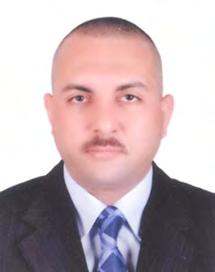
Developing the legislative aspect in the Egyptian energy sector requires reviewing exploration & production agreements with a new economic outlook and adding new updates to them in line with the changes in the present circumstances and the local energy requirements of Egypt. It is also working to link exploration & production agreements of oil and gas in Egypt to the establishment of energy manufacturing projects and access to final products of gas and crude oil that can be used locally and exported abroad.
In addition, new legislation should be introduced to support the expansion in the use of non-traditional sources of clean/green energy and provide the necessary assistance for the implementation of clean energy production projects, whether through government sector plans or private sector investments.
If we want to achieve tangible progress and real growth in the energy sector in Egypt, then we must embrace change and modernization, and a new generation of competencies in various different disciplines must be prepared to be able to lead the energy system in Egypt with great professionalism towards achieving major achievements.

GEOPOLITICAL RISKS TO WATCH IN 2023
BY IHAB SHAARAWYIncreasing geopolitical uncertainty and rising inflation are among the biggest risk factors for businesses in 2023 and despite the optimistic OPEC outlook for growth of global oil demand in 2023, energy market dynamics remain haunted by these ongoing risks for another year to come.
Here are some of the geopolitical risks to look out for in 2023.
Russia-Ukraine war
Russia’s war in Ukraine passed its 10-month mark in December, with no prospects for a peaceful settlement.
The war has resulted in hundreds of thousands of casualties, forced millions to flee their homes, and has had ripple effects globally on everything from energy to food supplies.
Despite recent advances by Ukrainian troops on some fronts, Russian intensified missile and drone attacks can tell that the conflict is not approaching an end any time soon. Though diplomacy has been successful in reaching important agreements on the export of grains or exchange of war prisoners, it has been unable to bring the two sides to the negotiation table since both sides insist on their demands that are refused by the other party.
In its last peace negotiation proposal, Ukraine said Russia could participate only if it first faces a war-crimes tribunal. That drew an angry response from the Kremlin, with Foreign Minister Sergey V. Lavrov saying that Kyiv must accept all of Russia’s demands, including that it gives up four Ukrainian regions that Moscow claims to have annexed.
Today, both sides believe that going to negotiations to end the war will depend on the strength it shows on the battlefield, thus their only way to peace is a longer and fiercer war.
The continuation of the Russia-Ukraine conflict has fueled Europe’s struggle to free itself from Russian energy that used to dominate European energy imports. This situation has implications for the entire global energy market.
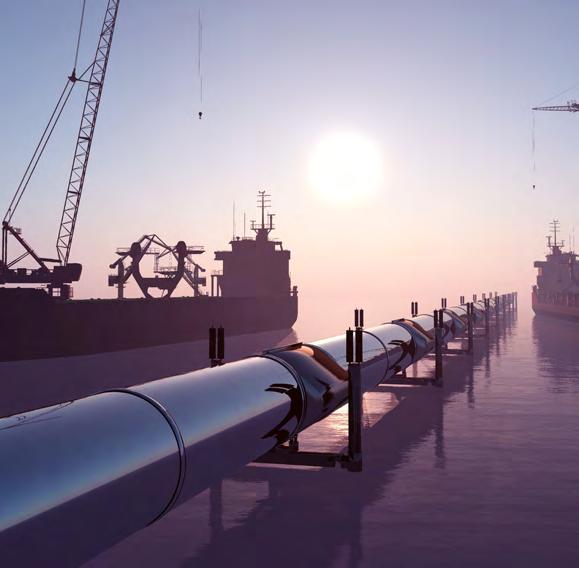
US-China Rivalry
The great competition between the US and China will likely be one of the most important themes to follow in the coming year. The relations between the two superpowers had already soared in 2022.
Although a conflict between US and China remains highly unlikely in 2023, competition and confrontation between the two countries are moving from the trade and technology realms into the military domain. Unfortunately, the escalation of such a conflict will have dire consequences for the whole world.
Last year was tense as China was insistently expanding its global diplomatic and security footprint, challenging US positions in subSaharan Africa, Latin America, and the Middle East. The US, meanwhile, teased China with growing relations with Taiwan, which has been governed independently of China since 1949, but Beijing views the island as part of its territory. The commitment of US President Joe Biden to defend Taiwan militarily if China attempted to take control of the island by force prompted Beijing to warn that America was "playing with fire."
Visits, last year, by US officials to the island pushed China to reinforce its military presence in Taiwan Strait.
The landscape of Sino-American relations in 2023 will be dominated by uncertainties. It will not be only about maintaining peace across the Taiwan Strait but also China’s tense relations with other powers rather than the US such as Japan, South Korea, Australia, India, and Europe, as well as its ties to its friends such as Russia. And beyond these, there is the question of whether the Chinese economy will be able to rebound.
Iran Fateful Year
Many observers think of 2023 as a critical year for the Iranian regime. Any change in the Iranian regime can mean a lot not only for Iran but also for the whole Middle East. It can also make its mark on global markets, especially for energy.
In 2022, diplomacy failed to revive the Iranian nuclear deal, as the Biden administration, which was encouraging negotiations on reviving the Iranian nuclear deal, shifted to levying more sanctions on Tehran and condemned it for its support of Russian troops in Ukraine and for violently cracking down on a popular protest movement led by women.
At the time, the Islamic Republic was in the throes of a protest movement that’s considered to be one of its biggest challenges in decades. However, the Iranian economy is
spiraling and is on the cusp of reaching nuclear bombmaking capability. Still, uncertainty is dominating the scene in Iran.
Increasing tension in Korean Peninsula
In 2022, North Korea fired more missiles than ever before in a single year. The North Korean leader, Kim Jong-un, also declared that his country had become a nuclear weapons state and that its weapons were here to stay.
This has raised tensions on the Korean peninsula to their highest since 2017 when then-US President Donald Trump threatened North Korea with "fire and fury".
In 2023, North Korea is expected to continue to see ballistic missile tests while South Korea's President Yoon Suk-yeol insists that the South's military should respond with clear retaliation.
This tense situation can result in a catastrophe at any time. A new Korean war can pose a real threat to humanity’s well-being, and if it goes nuclear, may threaten the very existence of humanity itself.
An escalation on the Korean Peninsula could also disrupt trade and economic activity in this vital part of the world, as insurance costs for ships moving cargo in and out of the region will skyrocket.
Economists expect that in case of conflict escalation, the whole world will suffer, including emerging market currencies. And of course, weaker local currencies tend to dampen both consumer and corporate spending.
COVID Resurgence
Three years after the first outbreak of Covid-19, China is struggling to contain a coronavirus resurgence. This health crisis has nourished fears about new waves of the pandemic in different parts of the world.
Global health officials cautioned the public against letting its guard down while acknowledging a change in outlook nearly three years after the virus was first detected. The World Health Organization (WHO) has yet to declare an end to the COVID public health emergency introduced in January 2020.
Experts expect 2023 to bring COVID's full impact on global health into sharp focus.
The pandemic has disrupted all kinds of healthcare, from childhood immunizations to cancer screenings. Life expectancy in some countries has fallen, while mental health concerns have skyrocketed.
It has unleashed a devastating blow to the global economy, disrupting supply chains while choking off demand.
Many experts wonder whether these changes will persist, and what kind of policies can be implemented in response.
ROLE OF PETROLEUM ENGINEERING IN CLIMATE CHANGE
In November 2022, Egypt hosted COP 27 to discuss the ways to effectively tackle the global challenge of climate change. It is clear nowadays that humans face one of the major challenges in their history. It is a direct danger to humans. Our environmental changes dramatically warn us about catastrophic future effects for the next generations. The winter gets colder and the summer gets hotter every year. That directly affects millions of people that work in an open environment like construction workers or oil and gas upstream industry workers for example. These changes were the main reason for the floods in Pakistan which destroyed millions of houses and drove millions of people out of their homes. Unfortunately, we are all exposed to the consequences of these environmental changes.
The first thing to blame for the global climate crisis is the fossil fuels. Climate change activists worldwide put their goal to stop oil and gas production urgently and to directly switch to renewable energies although they are not reliable enough to fill the gap between demand and supply in energy. Global demand will reach about 660 quadrillion Btu in 2050, which is an increase of 15% versus 2021. It is recently documented that wind and solar energy fail in extremely cold environments. Renewable energy cannot replace the current energy supply of oil and gas.
The most reliable actions needed to reduce climate change consequences while covering the gap between energy demand and its supply gap are carbon capture and storage (CCS) and geothermal energy developments. In this area, petroleum engineers can play a vital role in decarbonizing energy sources.
The CCS projects’ role is to capture the emitted CO2 and store it in subsurface formations. It is an expensive operation and not lucrative enough to encourage companies to invest in such projects. The main cost of it goes to capturing and transportation. To solve that economic problem, it is needed to switch the economic model for CCS projects to be source/sink model instead of the HUB model. We need to store CO2 close to where it is produced. That should challenge petroleum engineers who have experience with similar operations to update the criteria of selecting the proper formation for CO2 storage and finding an efficient way for cheap reliable CCS projects that can be distributed to CO2 major sources and divide its cost among the industrial areas around the world to switch them to net zero CO2 emissions. Petroleum engineers are experienced in drilling wells and operating them for sustainable CO2 storage.
Geothermal reservoir development is another reliable solution for climate change consequences. It is a reliable renewable source of energy in which injection of cold water is done to produce hot water from other wells to use the difference in temperature as energy supply. It’s the same operation that petroleum engineers do for their water flooding projects. The geothermal energy industry nowadays seeks for innovative solutions to select the proper geothermal reservoir instead of injecting in that deep basement rocks (Basalt) and to maximize the efficiency of geothermal projects.
Petroleum engineers are the key players in facing the climate change consequences. Governments and investors need to support their research projects, their skills, and their curricula for their new key roles. Each country must start its geothermal and CCS projects. That will make our earth safer for future generations.
MOHAMED ADEL GABRYGraduate Research Assistant, University of Houston Senior Petroleum Engineer /Khalda Petroleum Company
TIME FOR IMPLEMENTATION ... A
SLOGAN
FOR ALL T
he world needs a complete understanding of the consequences of global warming and the impact of climate change that affect us on a daily basis.
In November 2022, COP 27 in Sharm El-Sheikh was held taking the slogan of “Time for Implementation”, and its most prominent outcome was the establishment of a fund to assist the affected countries, but is this enough?
In fact, financial aid is not a cure for the problem at all, but it is a sedative for the affected countries and a bandage for their wounds from the effects of the climate, but the actual solutions are many, including reducing our consumption of energy during all our daily activities as individuals, institutions, companies and therefore countries in general. Every unit of energy negatively affects our lives and our future, so it’s a must to consider energy as a valuable thing, even if sometimes it is not expensive, but the problems of its use and its effects are very expensive to cure, so rationalizing our consumption of energy is very important.
Energy management is a difficult matter and more attention should be given to it at the level of institutions, companies, and countries. Many institutions and companies suffer from the use of equipment with an energy efficiency of less than 50%, which means that half of the energy used is wasted because this machine is old or has technical problems. It’s a big loss which we shouldn’t miss.
Therefore, increasing energy efficiency in all sectors is a task that must be done effectively and quickly so that we can stop this waste, which could cost companies millions of dollars without exaggeration.
It’s necessary for all countries to make it compulsory for every company and institution to submit annual reports revealing their energy management plan, the level of energy efficiency and the rationalization of energy capacity they have carried out during the year. Their performance should affect the taxes of these companies and there should be exceptional rewards for energy-saving companies and fines for inefficient consuming companies.
To help this world to become better and survive the impact of climate change, each of us must reduce our energy consumption as much as possible until renewable energy will be able to produce more than 50% of our consumption at least. This is the longest and most difficult path that we seek and we will be able to reach it only through hard work, commitment and cooperation. At this time, we will not call for a new COP but we will invite all the countries to enjoy a greener world, especially in Sharm El-Sheikh.
ENG. MOHAMED ATIA
Process Engineer, Egyptian Refining Company (ERC)



